 17/09/2009 07:19 17/09/2009 07:19 |
|
| | | OFFLINE | | Post: 18.409
Post: 1.062 | Registrato il: 28/08/2005
Registrato il: 20/01/2009 | Administratore | Utente Veteran | |
|

  Benedict XVI inspires
Benedict XVI inspires
the new historiography
of Vatican-II
Two new readings rediscover 'uninterrupted Church tradition'
and the non-dogmatic weight of the Council
by Roberto de Mattei
Translated from

ROME - The Second Vatican Council, which until recently appeared to have been outsourced to the historiographic reading of the so-called 'school of Bologna', is starting to be the object of a new phase of historico-critical reflection which takes off from the now celebrated address by Benedict XVI to the Roman Curia on December 22, 2005.
Papa Ratzinger himself has returned to his argument many times. The last time was in his address to the participants of the plenary assembly of the Congregation for the Clergy on March 16, 2009, in which the Pope recalled the need to be true to 'the uninterrupted ecclesial tradition' and "to promote among priests, but especially among seminarians, a correct reception of the texts of the Second Vatican Council, interpreted in the light of the Church's entire doctrinal teachings".
[ Actually, he last referred to Vatican-II briefly but very powerfully in his Sept. 8 address to the bishops of Brazil's West sector, to whom he said:
In the decades that followed the Second Vatican Council, some have interpreted openness to the world not as a demand of the missionary ardor in Christ's heart, but as a transition to secularization, seeing in it some values of Christian importance such as equality, freedom and solidarity, and willing to make concessions and discover areas of collaboration.
Thus we have heard interventions by some ranking Church officials speaking out in public debates on ethics, responding to the expectations of public opinion, but neglecting to speak of certain fundamental truths of the faith like sin, grace, the evangelical life and the 'last things' [hell, purgatory, the Last Judgment]."
Without realizing it, many ecclesial communities have ended up in self-secularization: Hoping to please those who have distanced themselves from the Church, some of our colleagues have seen instead many who were in the Church leave, defrauded and disillusioned.
The only way to make Vatican-II credible - Cardinal Ratzinger always maintained, as he does now, as Benedict XVI - is to present it as part of the entire and single tradition of the Church and its Faith.
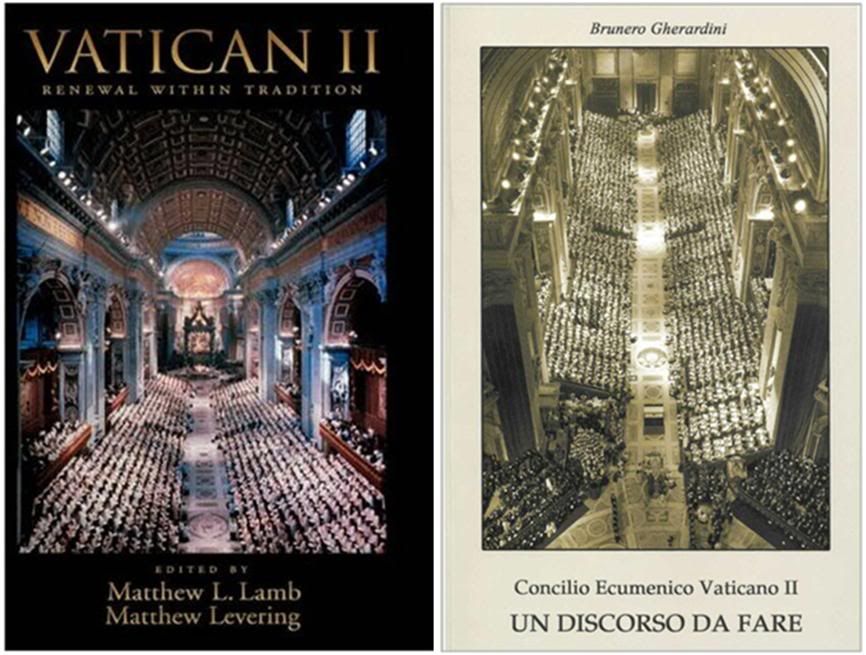
This is the niche carved out by the recent book Vatican II. Renewal within Tradition (Oxford University Press, 2008) by Matthew Lamb e Matthew Levering, professors at Ave Maria University in Florida.
Benedict XVI's December 2005 address, which opens the book, is followed by many contributions dedicated respectively to the four conciliar constitutions, nine decrees and three declarations of Vatican II.
The authors are all prestigious. Among them, two American cardinals (the late Avery Dulles and Francis George, current president of the United States Conference of Catholic Bishops); noted theologians like Dominican Fr. Charles Morerod from the Angelicum University (and secretary of the International Theological Commission); and well-known scholars like philosopher of law Russell Hittinger.
The common fundamental theme is that Vatican II can only be understood in continuity with the bimillenary tradition of the Church, according to Leo XIII's formula, "vetera novis augere et perficere” (to augment and complete the old with the new).
The thesis is demonstrated through a textual analysis of the documents, which would be considered 'reductive' by those who maintain the qualitative priority of the 'event' itself compared to its decisions, which as Giuseppe Alberigo [editor of the Bologna school Vatican-II interpretations] wrote, "they cannot be read as abstract normative dictates but as an expression and prolongation of the event itself".
A second entry into this new historiography is the recent book by Mons. Brunero Gherardini, Concilio ecumenico Vaticano II. Un discorso da fare (The Second Vatican Ecumenical Council: A discourse to be made), published by Casa Mariana Editrice di Frigento by the Franciscans of the Immaculate.
The work's importance is not only due to its content but for the author himself, who is a dean at the Pontifical Lateran University, postulator for the canonization of Pius IX, editor of the journal Divinitas, and the last representative of the great 'school of Roman theology".
Further reinforcing the book's authoritativeness are the preface buy Mons. Mario Oliveri, Bishop of Albenga, and Mons. Alberl Malcom Ranjith, Archibshop of Colombo.
The central theme of Mons. Gherardini's book is the pastoral nature of the Council, a point on which advocates of varying views about Vatican II are substantially in agreement.
Vatican II was a pastoral council [as opposed to doctrinal]: this was always made clear by John XXIII, Paul Vi and their successors up to the present Pope.
But what are the consequences of this 'pastorality' which is, ultimately, the relation of the Church to the world?
Vatican II, Gherardini points out, being a pastoral council, did not have a 'defining' doctrinal character. The absence of any defining intentions seems contradicted by the adjective 'dogmatic' which the Council used for two of its important constitutions: Lumen gentium and Dei verbum.
In fact, says the author, these documents were called 'dogmatic constitutions' only because they recapitulated and reproposed, as truths of the faith, dogmas that had been defined in preceding Councils.
The fact that only these two documents were called dogmatic makes it evident that the others did not have a dogmatic nature.
Of course, Vatican II has its own specific teaching which is authoritative, but as Gherardini explains, "its teachings which are not traceable to previous definitions, are neither infallible nor irreformable, and therefore, not even binding - which means that whoever rejects them cannot be called heretical for doing so. But those who would impose this order of teachings as infallible and irreformable are acting contrary to the Council itself."
It follows that one can apply a dogmatic character to Vatican-II documents only insofar as it reproposes dogma defined by previous councils as truths of the faith.
"Indeed, the doctrines which properly come from Vatican II itself, can absolutely not be considered dogmatic, because they are devoid of an indispensable formal definitiveness and therefore of the corresponding voluntas definiendi (intention to define", Gherardini says.
This is not to say Vatican II must be consigned to the attic or be ignored. "This has to do with respecting the nature, the purpose and the pastorality that the Council claimed for itself".
Benedict XVI states that Vatican II should be read in the light of Tradition, advocating a 'return to the truth of the text' which goes beyond the intentions or consequences of the Council as 'event'.
Nonetheless, Mons. Gherardini acknowledges that the texts present an ambiguity which could be subject to historical and theological criticism.
A typical example is the constitution referred to as 'pastoral', Gaudium et Spes, dated December 7, 1965 [the day before the Council ended], about the Church in the world today.
The word 'pastoral' describes its 'humanistic' approach of sympathy, openness and understanding of man, history and 'aspects of daily life and human society', with particular attention to 'the problems that seem to be most urgent'.
" The 19th- and 20th-century myth of Progress permeates the document: progress in culture and institutions; social adn economic progress; technological progress; and in general, 'human progress'.
"It is a newly-minted Christianity that enlarges its own domain :to the anonymous Christians of Karl Rahner and the implicit Christians of E. Schillebeeckx, beyond the Christians matured by the Conciliar sessions".
Gaudium et Spes, though it contains an implicit doctrine, is nonetheless devoid of a binding value in the points where it deviates from the Tradition of the Church.
Indeed, when a Council presents itself, as well as the content and the rationale of its documents under the category of pastorality - self-defining itself as pastoral - it thereby excludes every intent to define: "Therefore, it cannot claim to be dogmatic, nor can others confer this character on it".
Unlike all the other ecumenical councils in history, Vatican-II was not characterized by its doctrinal impact - much less dogmatic - but by the novelty of its approach, its assessments and the movement and activity that it introduced into the Church.
And the paradox lay in this: it was subsequently attempted to elevate to dogma a Council which had openly stated it did not intend to affirm any absolute principle. Pastoral concerns are not judged by its principles but by their concrete results.
Mons. Gherardini, echoing what Cardinal Ratzinger said in the 1995 Rapporto della Fede [The Ratzinger Report], points out that the ecclesial disaster that followed Vatican II, has assumed, with continued progression, gigantic proportions.
"It would not be difficult for an attentive observer and above all, for a consistent Catholic, to recognize the disaster and see it as among the effects of that relativism that I would compare it to the build-up of a tsunami that is slimy and overwhelming".
In the appeal to the Holy Father that concludes the book, Mons. Gherardini suggests that it is necessary to udnertake a careful and scientific analysis of the individual documents of the Council, or the documents in their ensemble, and of every topic they refer to, as well as the sources cited, both immediate and remote.
Such an analysis should also be comparative to the twenty other councils, to determine once and for all if Vatican II was an evolutionary continuity or if it represented any partial or total rupture.
Indeed, the Second Vatican Council cannot be greater than the Church and her Tradition.
A great article and a great development. I have been meaning to translate excerpts from Mons. Gherardini's book which have appeared in the blogs Disputationes Theologicae and Messainlatino.
[Modificato da TERESA BENEDETTA 26/04/2010 22:53] |
| |
|
| |
 17/09/2009 13:58 17/09/2009 13:58 |
|
| | | OFFLINE | | Post: 18.410
Post: 1.063 | Registrato il: 28/08/2005
Registrato il: 20/01/2009 | Administratore | Utente Veteran | |
|

 Benedict XVI visits
Benedict XVI visits
new headquarters
of the Vatican Observatory
 The Observatory's webpage on the Vatican site is quite active and very informative, and is in both Italian and English. It is part of the observance of the 2009 International Year of Astronomy.
The Observatory's webpage on the Vatican site is quite active and very informative, and is in both Italian and English. It is part of the observance of the 2009 International Year of Astronomy.
Yesterday, Sept. 16, Pope Benedict XVI paid his first visit to the new headquarters of the Vatican Observatory which was housed for decades in the Apostolic Palace in Castel Gandolfo.
The new headquarters is situated within the grounds of the Pontifical Villas, at its northern boundary where it adjoins the town of Albano. In an interview with L'Osservatore Romano, Fr. Jose Funes, director of the Observatory, says that its two telescopes remain in the Apostolic Palace.
There is no accompanying story for the Pope's visit so far, only the ff photos released by the Vatican.
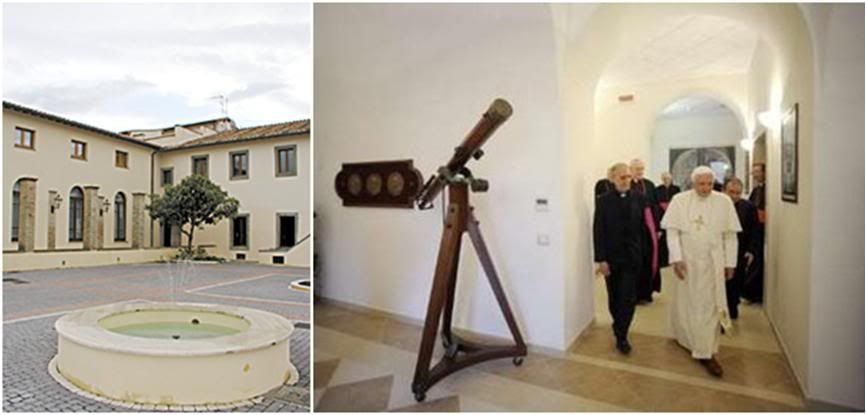
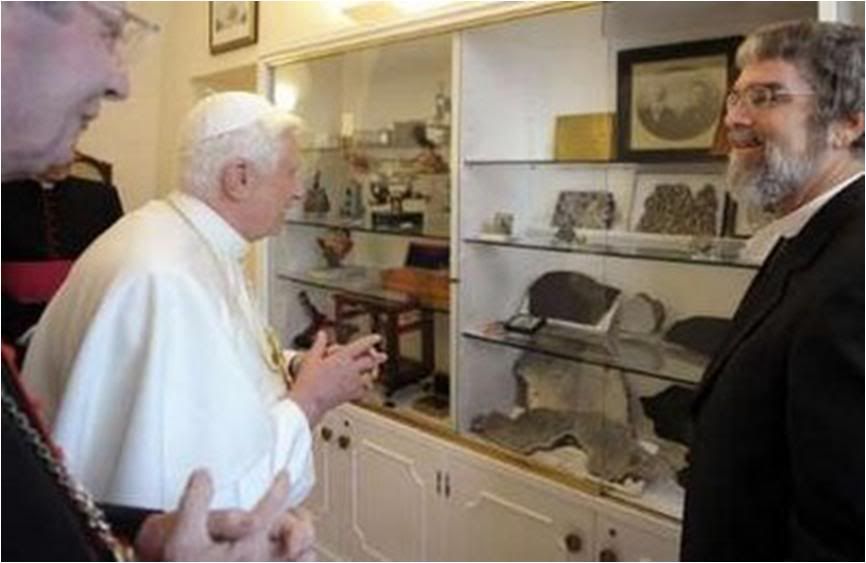
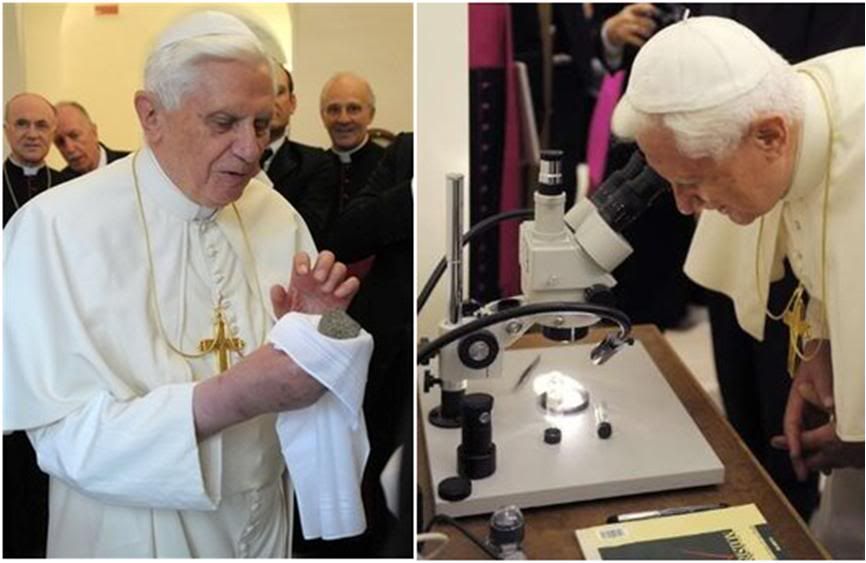 In these photos, the Pope looks at the Observatory Museum's collection of meteorite fragments and other space artifacts, including a rock from Mars.
In these photos, the Pope looks at the Observatory Museum's collection of meteorite fragments and other space artifacts, including a rock from Mars.
P.S. Here's the story on the above event from tomorrow's issue of L'Osservatore Romano.
At the blessing of the new Observatory offices:
A piece of Mars in the Pope's hands
by Gianluca Biccini
Translated from
the 9/18/09 issue of

It is not everyday that one can see the Pope holding a Martian rock in his hands, nor looking at a microscope to examine a fragment from a meteorite that fell to earth in his native Bavaria, although some of his predecessors may well have looked through some historic volumes written by Copernicus, Kepler and Newton. [What, no Galileo????]
All this happened Wednesday afternoon, Sept. 16, in Castel Gandolfo, when Benedict XVI visited the new offices of the Vatican Observatory, a world-renowned astronomical institution.
The Observatory's Jesuit staff [the order has traditionally been in charge of the Observatory] moved here last June from the Apostolic Palace where the Observatory has been housed since 1935.
Their new home is a converted inactive monastery on the grounds of the pontifical estate in Castel Gandolfo. About two kilometers from the Apostolic Palace, it is found on the extreme south end of the estate, near the gate that opens into Piazza Pia in the historic center of adjoining Albano Laziale.
The Pope spent almost an hour visiting with the small scientific community in a vary familial atmosphere. He was accompanied by Archbishop James Harvey, prefect of the Apostolic Household; his two private secretaries, Monsignors Georg Gaenswein and Alfred Xuereb; and Saverio Petrillo, director of the Pontifical Villas in Castel Gandolfo.
They were welcomed by Cardinal Giovanni Lajolo and Archbishop Carlo Maria Vigano, president and secretary-general, respectively, of the Vatican Governatorate (of which the Observatory is a special department), and by the Jesuit superior general, Fr. Adolfo Nicolas, and the director of the Observatory, Fr. Jose Gabriel Funes.
The Pope first blessed the premises and led a brief moment of prayer. Cardinal Lajolo showed him a plaque that commemorates the visit.
Then he was shown around the offices, the meeting halls, the school area [the Observatory offers summer courses for astronomers as well as periodic lectures], the library, the staff residence, and finally, the museum.
After viewing the Museum's historical collection of astrolabes and telescopes, the Pope spent some time looking at their precious collection of meteorite evidence from which much information about the primordial solar system has been deduced.
An American astronomer, Fr. Guy Consolmagno, showed him some of the more interesting specimens, particularly a rock from the meteorite shower in the locality of Nakhla, Egypt, in 1911, determined to have come from the Red Planet.
The Pope was given the rock - on a clean cloth - to examine, as he asked them about its composition and how scientists had ascertained that the meteorite came from Mars.
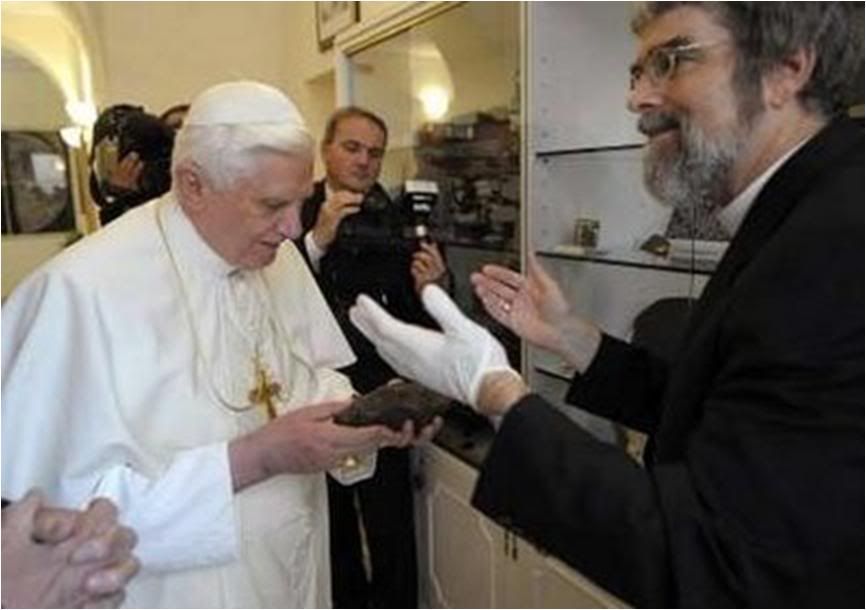
He also touched a large rock taken from the huge meteorite that fell on Devil's Canyon in Arizona and produced the largest meteorite crater on earth. And he looked at a moon rock [NASA gave moon rocks acquired from various expeditions to registered observatories around the world].
Afterwards, the director of technical services for Vatican state, explained to him the reconstruction work that had been carried out on the old monastery. Part of the complex will house a residence for visiting scientists.
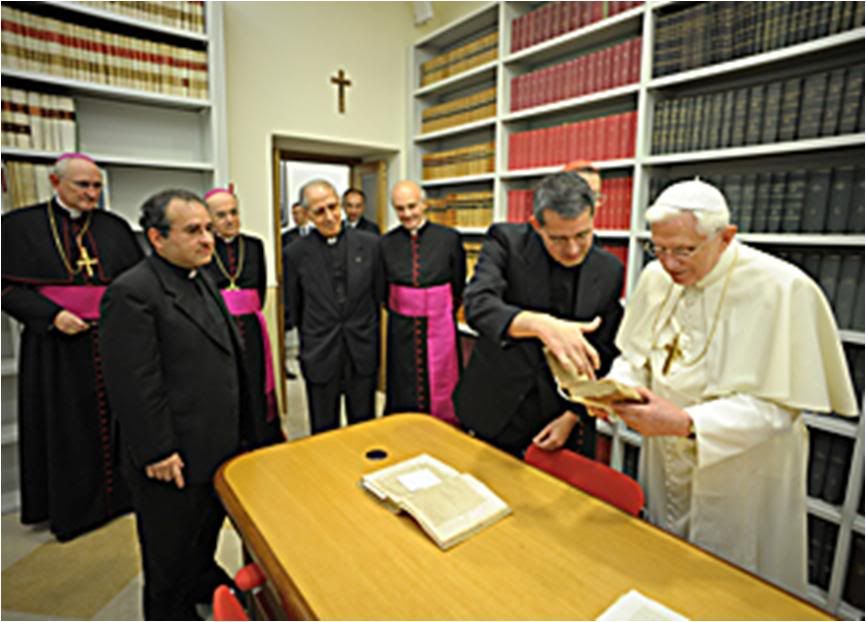
In the library, Fr. David Brown, an Oxford-trained astronomer, showed him historical editions of works which were seminal for astrophysics and cosmology: De revolutionibus orbium coelestium by Copernicus, Epitome astronomiae by Kepler and Newton's Philosophiae naturalis principia mathematica.
The Pope also looked at the volume Le stelle (The stars) by Fr. Angelo Secchi, who had pioneered the classification of stars according to their spectral characteristics. He said it brought him back to his years as a young priest in Munich [No further explanation given by the reporter]. Did youhg Fr. Ratzinger dabble in astronomy then?
Shortly afterwards, he looked through a microscope at the 1768 meteorite fragment from Bavaria.
He then proceeded to the chapel of the Jesuits, whose local superior is Fr. Giuseppe Koch. He signed a parchment which will be displayed alongside those of similar parchments signed by his predecessors, among them Pius XI, who by a singular coincidence, had visited the Observatory 75 years earlier, on September 16, 1934.
Observatory director Fr. Funes also showed the Pope the book entitled The heavens proclaim: Astronomy and the Vatican published this year by the Vatican publishing house.
The Vatican Observatory is one of the oldest in the world, originating in the second half of the 16th century, when Gregory XIII ordered the construction of the Torre dei Venti (Tower of the Winds) at the Vatican, inviting the Jesuit astronomers and mathematicians of the Collegio Romano to prepare the reforms that would lead to the Gregorian calendar in 1582.
The modern-day Observatory dates back to Leo XIII who issued a motu proprio Ut mysticam on March 14, 1891, establishing an Observatory in the Vatican Gardens behind St. Peter's Basilica. The new headquarters is the fourth one for the Observatory since then.
Since 1981, the Observatory has maintained a major research site in cooperation with the University of Arizona's Stewart Observatory in Tucson. Vatican astronomers developed the first infrared telescope and mounted it on Mt. Graham in Arizona, considered the best astronomical observation point in North America.
The current version of the telescope is called VATT (for Vatican advanced technology telescope), one of three super-telescopes on the mountain. The two others belong to American observatories.
 Above, from left, VATT locator in the United States; a view of VATT; and two other super-telescopes on Mt. Graham. Below, from left, a general view of Mt. Graham; the Vatican book on astronomy; and a poster announcing the Vatican Observatory's summer school (VOSS) for 2010.
Above, from left, VATT locator in the United States; a view of VATT; and two other super-telescopes on Mt. Graham. Below, from left, a general view of Mt. Graham; the Vatican book on astronomy; and a poster announcing the Vatican Observatory's summer school (VOSS) for 2010.

The Observatory's activities are made possible through the Vatican Observatory Foundation headed by the immediate past director of the Observatory, Fr. George Coyne, who was also present Wednesday in Castel Gandolfo.
[Modificato da TERESA BENEDETTA 17/09/2009 21:34] |
| |
 17/09/2009 15:22 17/09/2009 15:22 |
|
| | | OFFLINE | | Post: 18.411
Post: 1.064 | Registrato il: 28/08/2005
Registrato il: 20/01/2009 | Administratore | Utente Veteran | |
|
 Thursday, Sept. 17
Thursday, Sept. 17
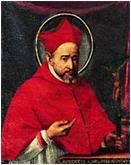 ST. ROBERTO BELLARMINO [Robert Bellarmine] (Italy, 1542-1621)
ST. ROBERTO BELLARMINO [Robert Bellarmine] (Italy, 1542-1621)
Jesuit, Cardinal, Doctor of the Church
Canonised 1930
Buried in Jesuit Church of Gesu, Rome,
beside his pupil, St. Luigi (Aloysius) Gonzaga
OR today.
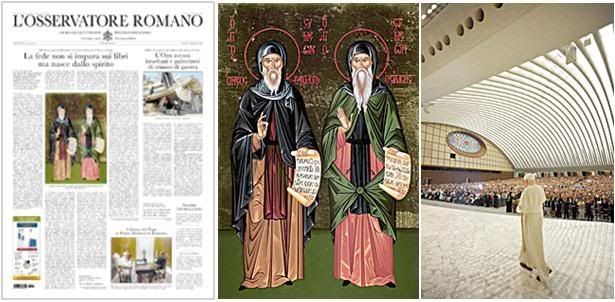 Illustration: Icon from Sofia, Bulgaria, showing St. Simeon (left) and his spiritual master Simeon the Pious.
Illustration: Icon from Sofia, Bulgaria, showing St. Simeon (left) and his spiritual master Simeon the Pious.
At the General Audience yesterday, Benedict XVI spoke about Symeon the New Theologian:
'Faith is not learned from books but is born from the spirit'
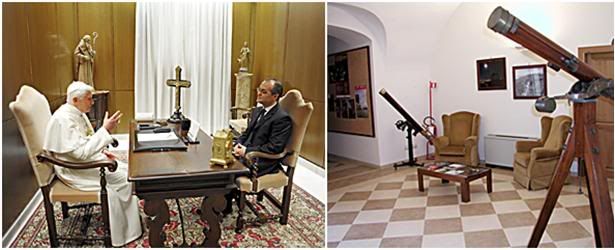
Other Page 1 stories: The Pope's audience with the Prime Minister of Romania; and a UN report accuses both
Israelis and Palestinians of war crimes in report on last year's Gaza Strip hostilities. The inside pages
contain an interview with Fr. Jose Funes, director of the Vatican Observatory (right photo above shows some
of the astronomical instruments in the Observatory's museum).
THE POPE'S DAY
The Holy Father met today with
- Bishops of Brazil (Northeast Sector-3) on ad limina visit. Address in Portuguese.
- HRH Grand Duke Henry of Luxembourg and his delegation, on the occasion of his receiving
the 2009 Cardinal Van Thuan award for solidarity and development.
WITH THE DUKE OF LUXEMBOURG
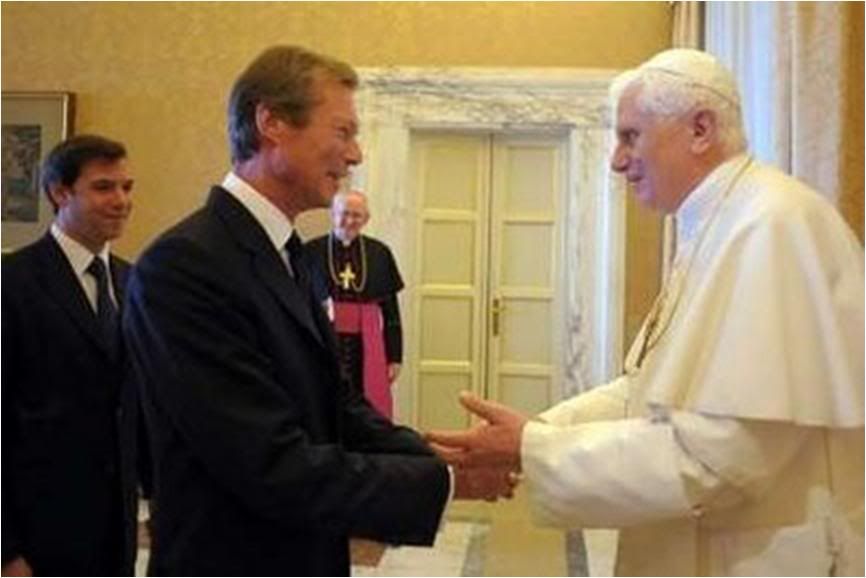 Behind the Duke is Crown Prince Guillaume
Behind the Duke is Crown Prince Guillaume.
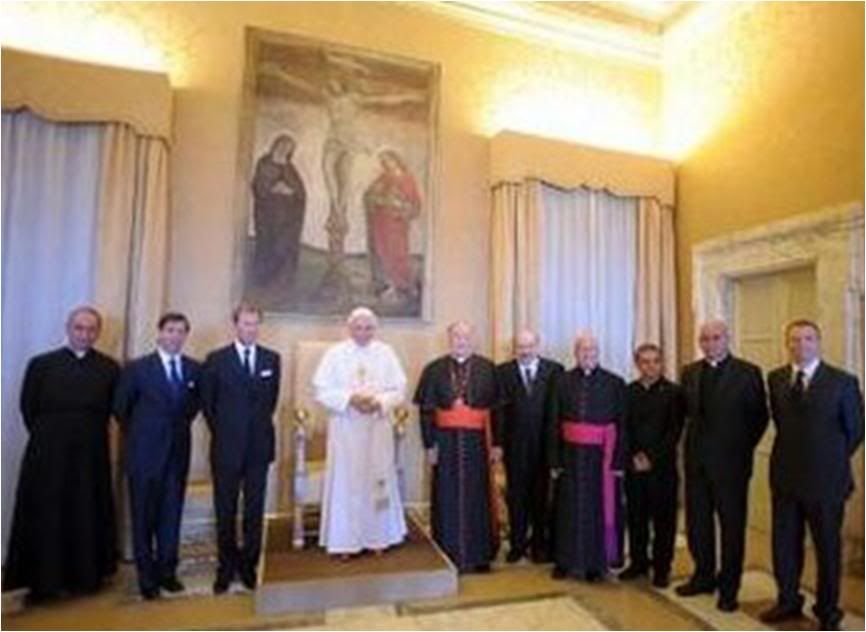 Pope calls for an end to bloodshed
Pope calls for an end to bloodshed
in Afghanistan, as six Italian soldiers among
many victims of latest terrorist bombing
From the English service of

Sept. 17, 2009 (RV) - On Thursday Pope Benedict appealed for an end to bloodshed in Afghanistan, expressing his hope that it “can be replaced in the end by peace” to which so many people “are committed and giving their lives”.
The Popes was reacting to news of the latest attack on peace-keeping troops and civilians by Taliban militants, in which six Italian soldiers were killed.
Vatican Press Office Director Fr. Federico Lombardi told journalists that the Pope was deeply saddened by what happened assuring his prayers for the victims and closeness to the families and everyone involved.
[Modificato da TERESA BENEDETTA 19/09/2009 17:53] |
| |
 17/09/2009 22:21 17/09/2009 22:21 |
|
| | | OFFLINE | | Post: 18.413
Post: 1.066 | Registrato il: 28/08/2005
Registrato il: 20/01/2009 | Administratore | Utente Veteran | |
|

 Pope Benedict sends holiday wishes to Italian Jews;
Pope Benedict sends holiday wishes to Italian Jews;
looks forward to synagogue visit soon

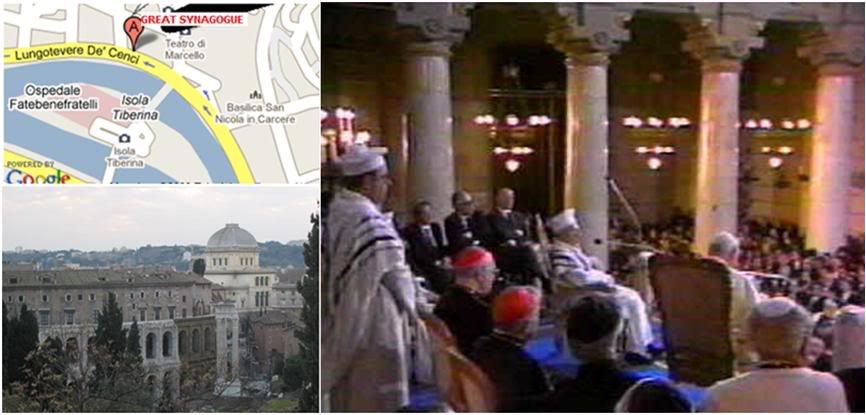 Rome's Great Synagogue is directly on the north bank of the Tiber opposite Isola Tiberina, the island on the river where St. Bartholomew Church and the Fatebenefratelli Hospital are located; right photo shows John Paul II giving his address during his 1986 visit to the synagogue.
Rome's Great Synagogue is directly on the north bank of the Tiber opposite Isola Tiberina, the island on the river where St. Bartholomew Church and the Fatebenefratelli Hospital are located; right photo shows John Paul II giving his address during his 1986 visit to the synagogue.
Rome, Sept. 17 (dpa) - Pope Benedict XVI indicated Thursday he will visit Rome's main Jewish house of worship after a series of Jewish religious commemorations that are set to end on October 10.
The German-born Pontiff expressed "joy" at the prospect of visiting Rome's Great Synagogue, in a telegram of good wishes to the city's Chief Rabbi Riccardo Di Segni ahead of the Jewish holidays of Rosh Hashanah, Yom Kippur and Sukkoth.
[In 2009 Rosh Hashanah (Jewish New Year) begins at sundown on Friday September 18 and ends at nightfall on Sunday September 20; Yom Kippur (Day of Atonement) begins at sundown on Sunday September 27 and ends at nightfall on Monday September 28; and Sukkot (the 7-day Feast of Tabernacles) starts at sunsent Friday, October 2, and ends on Friday at sunset on Friday, Oct. 9.]
Benedict, in the telegram, said the purpose of the visit - which would be his first since his 2005 election as Pope - "is to manifest my personal closeness and that of the whole Catholic Church," according to the text published by the ANSA news agency.
Vatican officials confirmed that the visit was being planned, but said no precise date has been set.
In 1986, Benedict's predecessor, the late John Paul II, made the first known visit by a modern-day Pope to a Jewish house of worship when he visited Rome's Great Synagogue.
Earlier this year, Benedict's decision to lift the excommunication of four ultra-traditionalist clerics from the rebel Society of Saint Pius X, including one who, it later emerged, is a Holocaust denier, strained relations with Jews.
The situation improved when Benedict subsequently admitted mistakes had been made in handling the case of the rebel bishops, as well as his insistence that members of Saint Pius X fully accept Vatican teachings on good relations with Judaism.
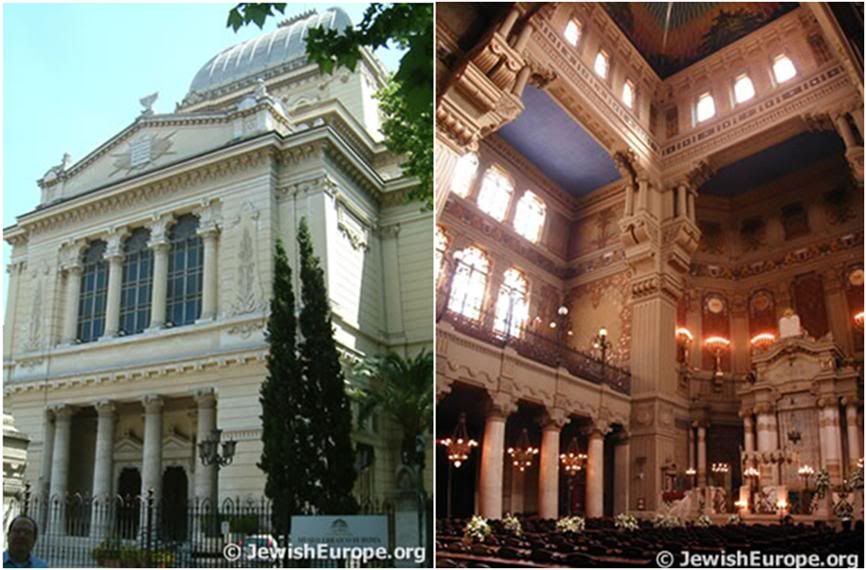 The Great Synagogue was built in 1904.
[And how can the reporter and editor overlook saying that this would be Benedict XVI's third visit to a synagogue since he became Pope? He visited the Synagogue in Cologne in August 2005 and Park East Synagogue in New York City in April 2008.]
Here's how the Jewish news agency reported this.
Pope will visit Rome synagogue
The Great Synagogue was built in 1904.
[And how can the reporter and editor overlook saying that this would be Benedict XVI's third visit to a synagogue since he became Pope? He visited the Synagogue in Cologne in August 2005 and Park East Synagogue in New York City in April 2008.]
Here's how the Jewish news agency reported this.
Pope will visit Rome synagogue

ROME, Sept. 17 (JTA) -- Pope Benedict XVI said he would visit the main synagogue in Rome after the High Holidays.
In Rosh Hashanah greetings to Rome's Jewish community released Thursday by the office of Rome's chief rabbi, the Pope said he looked forward "with joy" to the visit, which he said was motivated by "my personal nearness and that of the whole Catholic Church" to the Jewish community.
In his message the Pope invoked "abundant blessings" and "constant encouragement in the deep commitment to promote justice, harmony and peace."
Chief Rabbi Riccardo Di Segni called the message "significant and important."
The announcement that the Pope was planning to visit the Great Synagogue of Rome was not a surprise. In March, the president of the Rome Jewish community had said the Pope would visit the synagogue this fall.
Benedict has visited synagogues in Germany and the United States as pope, but his visit to the Rome synagogue would be the first papal visit there since the historic visit by Pope John Paul II in 1986. That visit marked the first time a reigning pontiff had entered a synagogue.
The online service of
 has provided the full text of the Pope's telegram,
has provided the full text of the Pope's telegram,
made public by Chief Rabbi Riccardo Di Segni, and translated here:
This year once again, on the oocasion of Rosh Ha Shana 5770, Yom Kippur and Sukkot, I gladly express my most heartfely wishes to you and the Jewish community of Rome.
Even as I hope that these feasts may be a reason for common holy joy. For all Jews, I invoke the Eternal for his copious blessings and constant encouragement in the generous commitment to promote justice, concord and peace.
I renew to you my cordial friendship and look forward with joy to my visit, after your feasts, to your community and to the synagogue, inspired by the sincere desire to manifest my personal closeness and that of the entire Catholic Church.

[Modificato da TERESA BENEDETTA 18/09/2009 00:29] |
| |
 18/09/2009 02:47 18/09/2009 02:47 |
|
| | | OFFLINE | | Post: 18.414
Post: 1.067 | Registrato il: 28/08/2005
Registrato il: 20/01/2009 | Administratore | Utente Veteran | |
|
 Pastors after God's own heart
Pastors after God's own heart

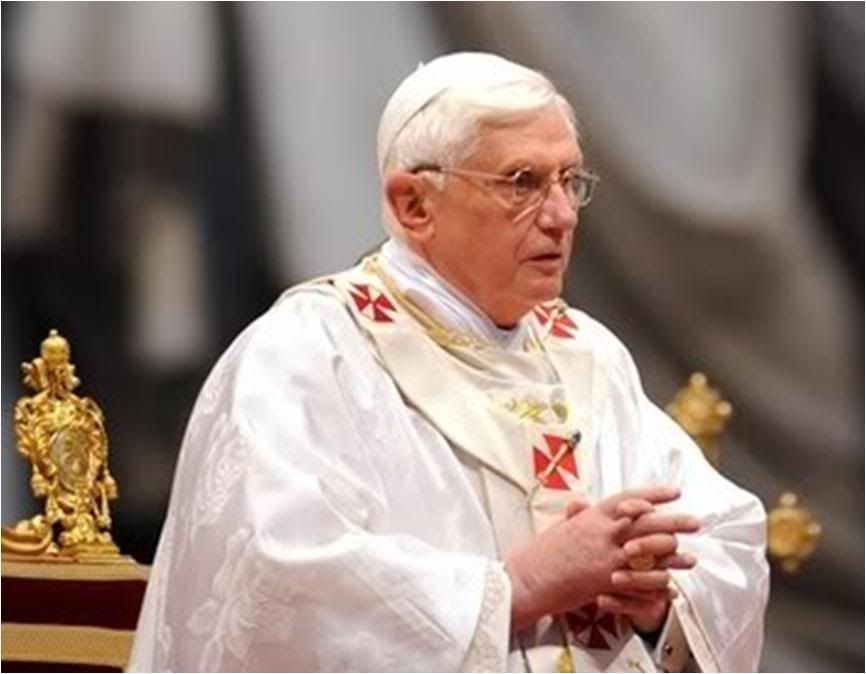
VATICAN CITY, Sept. 17 (Translated from FIDES) - The Holy Father's homily at St. Peter's Basilica on Saturday, Sept. 12, when he ordained five new bishops has resounded widely.
Though such resonance is in some ways unjustified, in other ways , it is plausible. One must always remember that when Peter speaks, he addresses the whole Church and that his Magisterium is always universal in character, as is proper to the Pope's personal responsibility.
Therefore, it is improper to attribute to any of his interventions specific references to situations and persons, or worse, to mundane political events.
Unfortunately, public information tends to promote such a perspective - for headline value, usually - and routinely attributes direct intentionality to general discourses.
Equally noteworthy is the media interest in certain statements of the Holy Father picked out of an ample homily that had great theological substance, as though those statements had been 'extraordinary revelations' that had never been said before!
Benedict XVI said this:
Faithfulness is altruism, and as such, it is liberating for the priest himself and for those who are entrusted to him. We know how in civilian society, and not seldom in the Church, things go bad when many of those who have been given a responsibility, work for themselves rather than for the community, for the common good./DIM]
Most of the newspapers dwelt on this passage, omitting the fact that the main example given by the Pope had been 'in civilian society'. So if he was exhorting anyone, it was an exhortation to everyone - 'even in the Church' - who are invested weith responsibility in any field.
Two references concerning the Church in the statement do appear extraordinarily courageous and prophetic - "not seldom' and 'many'. It is clear that the adjective 'many' refers to offenders in both civilian society and the Church, but the 'not seldom' is without a shadow of doubt a clear and unequivocal judgment on the Church, a strong call to conversion for the Pastors of the universal Church, to all those who are invested with responsibility in the Church, especially the successors to the Apostles.
What could be more natural and physiologic than a Father who calls the attention of his own children? It is a sign of love and merciful charity toward them.
This admission of 'imperfection' within the Catholic hierarchy itself may have been surprising to some, and in fact, did raise eyebrows. But not from a Pontiff who, at a time when hardly anyone thought he would be Pope in just a few weeks, publicly denounced the 'filth inside the Church' [2005 Via Crucis at the Colosseum],
His point is that in exercising the priestly ministry - or civlian functions, for that matter - to use others instead of being of use to them, makes the responsible person unhappy.
Both in psycho-anthropological and in evangelical terms, everyone knows how selfishness and evil progressively suffocate those who live off them. Moreover, it is clear that those who still need to use power to assert themselves because they have not experienced - or do not acknowledge the possibility - of being 'affirmed by God', affirmed and grasped by the Mystery of Good who creates all things and who, alone, 'makes' Pastors.
The true concern is about persons constituted in reponsibility who, because they are still uncertain of God's freely-given love, must seek gratification and a human foothold (perhaps too human), believing deludedly to thus find a response to their own existential needs.
True freedom instead has no price! Not the freedom that is born from the joyous certainty of having God as its only reference and guanrantee of one's own full realization.
In humble and faithful compliance with God's will, man finds himself, and discovers an unexpected interior equilibrium, which gives him a capacity for giving freely, overcoming through grace every human form of selfishness.
Let us then pray to the Lord of harvests, that he may always give us 'pastors after his own heart', contemplatives of Divine mercy and, therefore, possessing great interior and public equilibrium.
|
| |
 18/09/2009 12:03 18/09/2009 12:03 |
|
| | | OFFLINE | | Post: 18.416
Post: 1.069 | Registrato il: 28/08/2005
Registrato il: 20/01/2009 | Administratore | Utente Veteran | |
|
 Pope tells Brazilian bishops
Pope tells Brazilian bishops
priests are irreplaceable
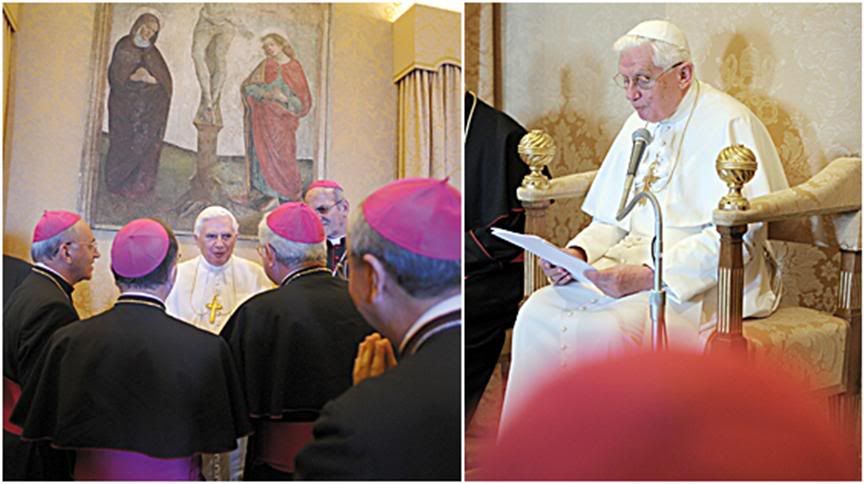
CASTEL GANDOLFO, Sept. 17 - The Holy Father today addressed the bishops from the northeast sector of Brazil who are making their ad-limina visit. He met with the bishops of West Brazil last week. Here is a translation of the address, which was delivered in Portuguese.
Venerated brothers in the Episcopate,
Like the Apostle Paul in the early church, you have come, dear pastors of the ecclesiastical provinces of Olinda and Recife, Paraiba, Mozaio and Natal, to visit Peter (cfr Gal 1,18).
I welcome and greet each of you, starting with Mons. Antônio Munoz Fernandes, archbishop of Maceió, whom I thank for the sentiments which he expressed in behalf of you all, speaking as well of the joys, th edifficulties and the hopes of the pilgrim people of God in Northeast Sector 2. In your individual persons, I embrace the priests and faithful in your diocesan communities.
With her faithful and her ministers, the Church is the priestly community on this earth that is organically structured as the Body of Christ, in order to carry out effectively, in union with its head, her historical mission of salvation.
Thus St. Paul instructs us: "Now you are Christ's body, and individually parts of it" (1 Cor 12,27). But the parts do not all have the same function: this is what constitutes the beauty and the life of the body (cfr 1 Cor 12,14-17).
It is in the fundamental difference between the ministerial priesthood and the common priesthood that one understands the specific identity of ordained and lay faithful. That is why it is necessary to avoid the secularization of priests and the clericalization of the laity.
In this perspective, the lay faithful should be committed to expressing in reality, even through political involvement, of the Christian anthropological vision and the social doctrine of the Church.
On the contrary, priests should keep away from personal involvement in politics, in order to promote unity and communion among all the faithful and thus be a point of reference for everyone.
It is important to make this awareness grow in priests, religious and the lay faithful, encouraging them to be vigilant so that each one may feel motivated and act according to his own status.
The harmonious, correct and clear understanding of the relationship between the common priesthood and the ministerial constitutes today one of the most delicate points in the being and life of the Church.
The sparse number of priests could in fact lead the community to resign itself to such a deficiency, comforting itself at times with the fact that such a lack would better highlight the role of the lay faithful.
But it is not lack of priests that justifies a more active and consistent participation of the faithful. Indeed, the more lay faithful become aware of their responsibilities in the Church, the clearer the specific identity and irreplaceable role of the priest as pastor in the community and witness to the authenticity of faith and as the dispenser, in the name of Christ the Head, the mysteries of salvation.
We know that "the mission of salvation entrusted by the Father to his own incarnated Son was passed on to the apostles, and from them, to their successors - they receive the Spirit of Jesus in order to do theirt work in his name and person.
The ordained ministry is therefore the sacramental bond that connects liturgical action to what the apostles said and did, and through them, to what Christ - spring and foundation of the sacrament - said and did" (Catechism of the Catholic Church, No. 112).
Therefore, the function of the priest is essential and irreplaceable for the announcement of the Word and for the celebration of the sacraments, especially the Eucharist, memorial of Christ's supreme sacrifice, who gave his own Body and Blood.
That is why we must ask the Lord to send laborers for his harvest. Beyond this, it is necessary that priests manifest joy in their faithfulness to their own identity with the enthusiasm of mission.
Beloved brothers, I am sure that, in your pastoral solicitude and prudence, you seek particularly to assure the communities of your dioceses the presence of an ordained minister.
It is important to avoid that the present situation, when many of you are forced to organize the life of the Church with few priests, not be considered normal or typical of the future.
As I reminded the first group of Brazilian bishops last week, you must concentrate your efforts to awaken new priestly vocations and find the pastors indispensable for your dioceses, helping each other so that everyone may avail of more and better trained priests to sustain the life of faith and the apostolic mission of the faithful.
On the other hand, even those who have received Holy Orders are called on to live consistently and fully the grace and the commitments of Baptism - to offer themselves and their lives in union with Christ's sacrifice.
Daily celebration of the sacrifice on the altar and the daily praying of the Liturgy of Hours must always be accompanied by the witness of an existence that gives itself to God and to others, thus serving as orientation for the faithful.
In these months, the Church has before its eyes the example of the Holy Curate of Ars, who invited the faithful to unite their own life to the sacrifice of Christ, and offered himself, exclaiming: "How good it is for a priest to offer himself in sacrifice to God every morning!" (Le Curé d'Ars. Sa pensée - son coeur, coord. Bernard Nodet, 1966, pagine 104).
He continues to be an actual model for your priests, in particular, living your celibacy as a requirement of the total gift of self, an expression of that pastoral charity that the Second Vatican Council presents as the unifying center of priestly being and action.
Almost at the same time, in our beloved Brazil, there lived in Sao Paolo Fra Antônio de Sant'Anna Galvão, whom I had the joy to canonize on May 11, 2007. He too left a "testimony as fervent adorer of the Eucharist, living in laus perennis [perennial praise], in constant attitude of adoration" (Homily for his canonization, No. 2).
In this way, both (the Cure D'ars and Fray Galvao) sought to imitate Christ, making themselves not only priests but also victims and oblations like Jesus.
Beloved brothers in the Episcopate, there are already numerous signs of hope visible for the future of your local Churches, a future that God is preparing through the zeal and fidelity with which you carry out your episcopal ministry.
I wish to assure you of my fraternal support, and at the same time, I ask for your prayers so that I may be allowed to confirm everyone in the apostolic faith (cfr Lk 22,32).
May the Blessed Virgin Mary intercede for all the People of God in Brazil, so that pastors and faithful may, with courage and joy, "openly announce the mystery of the Gospel" (cfr Eph 6,19).
With this prayer, I impart my Apostolic Blessing to you and to the priests and faithful of your dioceses. "Peace to all of you who are in Christ" (1 Pt 5,14).
CNA had a good report on the Pope's address:
Priests cannot be
replaced by the laity

Castel Gandolfo, Italy, Sep 17, 2009 (CNA).- In an audience this morning with bishops visiting from Brazil, Pope Benedict XVI advised them on how to respond to the lack of priests, emphasizing that the shortage cannot be solved by having lay people substitute for the clergy.
The Holy Father began his address to the Brazilian prelates by pointing out the difference between the identity of priests and the laity. While the lay faithful share in the "common priesthood," they are not ordained ministers of Christ and His Church.
"Hence," the Pope cautioned, "it is important to avoid the secularization of clergy and the 'clericalization' of the laity."
Fulfilling the lay vocation, he explained, involves working to "give expression in real life - also through political commitment - to the Christian view of anthropology and the social doctrine of the Church."
On the other hand, "priests must distance themselves from politics in order to favor the unity and communion of all the faithful, thus becoming a point of reference for everyone," Benedict said.
When dioceses are faced with a lack of priests, the Pope emphasized that they should not resort to "a more active and abundant participation of the laity" since it could take away from their own calling.
"The truth is that the greater the faithful's awareness of their own responsibilities within the Church, the clearer becomes the specific identity and inimitable role of the priest as pastor of the entire community, witness to the authenticity of the faith, and dispenser of the mysteries of salvation in the name of Christ the Head," Benedict XVI stated.
"The function of the clergy is essential and irreplaceable in announcing the Word and celebrating the Sacraments, especially the Eucharist," he insisted, saying that for this reason it is "vital to ask the Lord to send workers for His harvest; and it is necessary that priests express joy in their faithfulness to their identity."
Looking to the future, the Pope made it clear that "the shortage of priests must not come to be considered as a normal or typical state of affairs."
He exhorted the bishops resolve the crisis by combining efforts to "encourage new priestly vocations and find the pastors your dioceses need, helping one another so that all of you have better-trained and more numerous priests to support the life of faith and the apostolic mission."
As the Church celebrates the Year for Priests and the 150th anniversary of the death of the "Cure of Ars," Pope Benedict pointed to the French priest as a model for priests, "especially in living a life of celibacy as a requirement for the total giving of self." This total gift of self is "expressed through that pastoral charity which Vatican Council II presents as the unifying center of a priest's being and actions," he reminded.
The Holy Father ended his address on a positive note, assuring the prelates that "many signs of hope" exist for the future of particular Churches. This future, he said is one that "God is preparing through the dedication and the faithfulness with which you exercise your episcopal ministry.
[Modificato da TERESA BENEDETTA 18/09/2009 13:54] |
| |
 18/09/2009 12:38 18/09/2009 12:38 |
|
| | | OFFLINE | | Post: 18.417
Post: 1.070 | Registrato il: 28/08/2005
Registrato il: 20/01/2009 | Administratore | Utente Veteran | |
|
 Sandro Magister takes note of the newly released volume in Joseph Raztinger's Collected Works, in which he also provides an English translation of Benedict XVI's Preface to the volume (previous translated and posted in a comprehensive post about the book release on this thread - see preceding page).
A newly published work
Sandro Magister takes note of the newly released volume in Joseph Raztinger's Collected Works, in which he also provides an English translation of Benedict XVI's Preface to the volume (previous translated and posted in a comprehensive post about the book release on this thread - see preceding page).
A newly published work
by Joseph Ratzinger
from 54 years ago
remains very relevant

ROME, September 18, 2009 – The publication in German of Joseph Ratzinger's "opera omnia" is moving forward fast. The first of the sixteen volumes planned came out less than a year ago. The second was presented to its author on Sunday, September 13, at Castel Gandolfo. A third will come out in November.
Interest in the first volume – properly speaking, the eleventh volume in the general outline – was increased by the author's desire to republish first his writings on the liturgy, which he calls "the central activity of my life."
The interest of this second volume lies, instead, in the fact that it finally makes public a text by Ratzinger that until now had never been published in its entirety: the thesis that he presented in 1955 in order to be allowed teach theology in the German universities.
After his first studies on Saint Augustine, it was suggested to the young theologian Ratzinger that he research the most Augustinian of the medieval theologians, the Franciscan Saint Bonaventure of Bagnoregio, and in particular, his ideas concerning divine revelation and the theology of history.
Ratzinger dug deep in his research. And he discovered that in Bonaventure, there is a strong connection with the vision of Joachim of Fiore, the Franciscan who had prophesied the imminent advent of a third age after those of the Father and the Son, an age of the Spirit, with a renewed and entirely "spiritual" Church, poor, reconciled with Greeks and Jews, in a world restored to peace.
One of his examiners, professor Michael Schmaus, didn't like the thesis. But Ratzinger avoided rejection by resubmitting only the second part of his text, which had not received any objections.
In later years, he resolved to produce a new and updated publication of the entire thesis, but was unable to do so. As cardinal, he resolved to work on it in his retirement. But then he was elected pPpe, and the project was inevitably scrapped.
Republished now in its original and complete version, the thesis seems to have been superseded here and there by later studies. Ratzinger realizes that. But he maintains that "the question of the essence of Revelation, which is the theme of the book, still has urgency today, perhaps even more so than in the past."
In reading his preface to this second volume of the "opera omnia", it can be grasped that Benedict XVI still sees as relevant the challenge that Bonaventure had to confront as superior general of the Franciscan order: the "dramatic tension between the 'realists', who wanted to make use of the legacy of Saint Francis according to the concrete possibilities of the life of the order as it had been handed down, and the 'spiritualists', who instead focused on the radical novelty of a new historical period."
Henri De Lubac, one of the greatest Catholic theologians of the twentieth century, dedicated an imposing two-volume essay to what he called "the intellectual posterity of Joachim of Fiore."
In the judgment of De Lubac, Joachim's vision – the friar "endowed with prophetic spirit" whom Dante placed in Paradise – has spanned the centuries and continues to influence a large portion of today's culture, including Catholic culture: a culture that dreams of "a new Church in which love must replace the law."
The exact opposite [?????] of that Caritas in Veritate which provides the title for Benedict XVI's latest encyclical, and informs his entire magisterium.
[Excuse me, but I fail to see how Caritas in veritate - the concept of 'love in truth' - can be 'the exact opposite' of 'love must replace the law' - which in the statement quoted by Magister from De Lubac, must refer to generic 'law' not God's 'Law'! (I had to go back and check the Italian original - and that's exactly what Magister wrote: 'the exact opposite... of Caritas in veritate'. !)
I am sure De Lubac expressed his formulation in a proper context, since traditionally, God's Law - the Commandments - can be reduced to one word, love: love of God and love of fellowmen. Love is the Law. A love that is always in the context of truth. ]
[Modificato da TERESA BENEDETTA 18/09/2009 12:49] |
| |
 18/09/2009 13:28 18/09/2009 13:28 |
|
| | | OFFLINE | | Post: 18.418
Post: 1.071 | Registrato il: 28/08/2005
Registrato il: 20/01/2009 | Administratore | Utente Veteran | |
|
 Friday, Sept. 18
Friday, Sept. 18
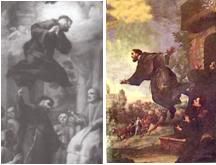 ST. GIUSEPPE DA COPERTINO (Italy, 1603-1663)
ST. GIUSEPPE DA COPERTINO (Italy, 1603-1663)
[Joseph of Cupertino]
Franciscan Mystic, Confessor
He was known to levitate during prayer
and on several occasions, 'flew'.
The most famous levitation occurred
during an audience with Pope Urban VIII
(engraving above)
OR today.
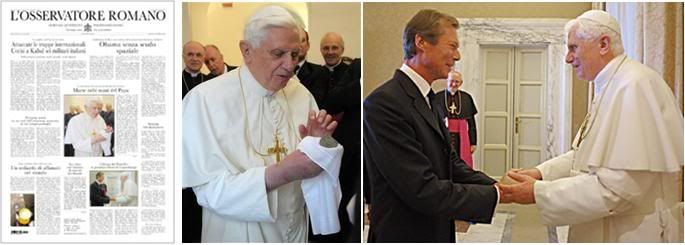 Papal stories in today's issue: The Pope prays for the six Italian soldiers killed in a terrorist attack in Afghanistan; his visit to
Papal stories in today's issue: The Pope prays for the six Italian soldiers killed in a terrorist attack in Afghanistan; his visit to
the Vatican Observatory on Wednesday; his address to the bishops of northeast Brazil; and his audience with the Grand Duke of
Luxembourg. Other Page 1 stories: President Obama scales down missile defense system and Russia hails decision; Yemeni air force
kill 90 in raid on a refugee camp; and the World Bank says a billion people are now suffering from chronic hunger.
THE POPE'S DAY
The Holy Father met today with
- Bishops of Brazil, Northeast Sector, Group 5, on ad-limina visit
- Archbishop Hilarion of Volokolamsk, President of the department for External Church Relations of
the Patriarchate of Moscow.
and this afternoon with
- Cardinal Angelo Bagnasco, Archbishop of Genoa and president of the Italian bishops' conference (CEI).
[Modificato da TERESA BENEDETTA 19/09/2011 16:54] |
| |
 18/09/2009 16:47 18/09/2009 16:47 |
|
| | | OFFLINE | | Post: 18.420
Post: 1.073 | Registrato il: 28/08/2005
Registrato il: 20/01/2009 | Administratore | Utente Veteran | |
|

 Missed this item yesterday.... Tried to check the original source, but I-media is a subscription service.
Fresh speculation on
Missed this item yesterday.... Tried to check the original source, but I-media is a subscription service.
Fresh speculation on
papal trips abroad in 2010:
Malta and the UK 'for sure',
Germany and Belarus, maybe

ROME, Sept. 17 (Translated from Apcom) - Pope Benedict XVI will probably undertake four trips abroad in 2010, but all in Europe, according to I-Media, a French news agency that specializes in Vatican news.
A one-day visit to Malta in April 2010 has been announced by the local bishops, while a trip to England appears certain. Two other possible trips are being kept under wraps, but they are said to be also in Europe.
Benedict XVI has been invited by both Tony Blair and Gordon Brown, in the name of the government of the United Kingdom, to visit, 20 years after John Paul II's trip to that country. If he does, a visit to Scotland and North Ireland at the same time is not ruled out.
A third possibility is Germany. In February, the German bishops announced that the Pope would make a third visit to his native country in 2010. Germany marks the 20th anniversary of reunification in October 1990.
Finally, Belarus. In 2008 and 2009, President Alexander Lukashenko invited the Pope. It is speculated that a visit to Minsk could also provide an occasion to meet in a 'third country' with Patriarch Kirill of Moscow.
Other possible European visits could be to Fatima or to one of the countries in northern Europe.
The item leaves out the other 2010 trip speculated on - to Asia, possibly Vietnam. As a Filipina, I have been hoping that he will visit the Philippines in 2011, when Asia's oldest university - formally called 'The Pontifical and Royal University of Santo Tomas' - celebrates the fourth centenary of its founding (it is older than Harvard). It has a current enrolment of about 30,000.

The Catholic bishops of the Philippines extended the invitation to the Pope last year, and perhaps a visit to the only Catholic nation in Asia would be appropriate for Benedict XVI's first Asian trip. Vietnam is only 3 hours away by air.
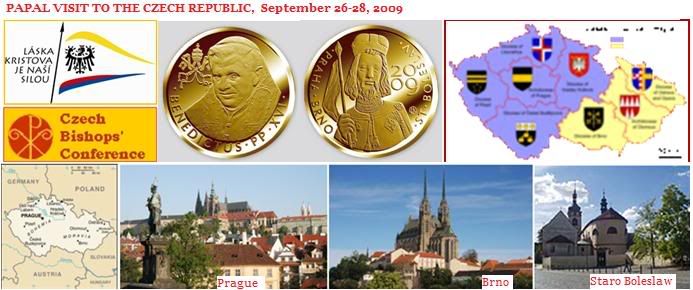 John Allen comments on the Czech and Malta trips in his weekly column today.
The Czech Republic:
John Allen comments on the Czech and Malta trips in his weekly column today.
The Czech Republic:
Not an easy mission
for the Pope

Sept. 18, 2009
Pope Benedict XVI hits the road again next weekend, travelling to the Czech Republic Sept. 26-28. One highlight will be his participation in the Feast of St. Wenceslaus on Monday, Sept. 28, which is a national holiday. St. Wenceslaus is the patron saint of the Czech Republic.
In strictly capitalistic terms, if religion were a "product," the Czech Republic would arguably be one of the worst markets for that product anywhere in the world.
Although secularization has spread all across Europe, Austrian sociologist Fr. Paul Zulehner reports that the former East Germany and the Czech Republic are really the only places where atheism has become in effect the "state church," meaning the conviction of a majority and the strongest culture-shaping force.
(The standard quip is thus that in East Germany and the Czech Republic, atheism is the only proven success of the erstwhile Communist regimes.)
Here's one sign of the times: The Prague Post, the country's leading English-language paper, has asked me to write an op-ed piece in advance of the trip, the working title of which is: "Does the Pope still matter?"
When the Pope travels to other parts of the world, local media usually ask me to speculate on how he might try to deploy his influence. Only in some pockets of Europe am I asked to comment on whether he still has any.
Benedict XVI also faces several more immediate challenges.
For one thing, a draft concordat between the Holy See and the Czech Republic is still in limbo after being rejected by the Czech parliament in 2003, on the basis of objections from some politicians that it made too many concessions to the Catholic church. (Among other things, there are still church-state disputes over property confiscated under the Communists.)
Czech President Václav Klaus, whom Benedict will meet on Sept. 26, is also a prominent Euro-skeptic and critic of claims about manmade global warming -- both positions tough to reconcile with the Vatican's official diplomatic line.
I'll be in the Czech Republic to cover the trip; watch the NCR Web site for my daily reports.
In the meantime, the Vatican says that Benedict XVI is considering a trip to Malta next April to commemorate the 1,950th anniversary of St. Paul's famous shipwreck on the tiny Mediterranean island. Officially, Malta is 98 percent Catholic, making it among the most Catholic societies on earth in terms of "market share."
Pope to be accompanied by 100 people
on visit to Czech Republic

VATICAN, Sept. 17 (CTK) - Pope Benedict XVI will be accompanied by a 29-member group of the Vatican representatives, including Secretary of State, Cardinal Tarcisio Bertone, and people from the International Catholic Centre, as well as up to 70 journalists, the Vatican administration has told CTK.
Benedict XVI, 82, and his team will fly to Prague aboard a plane of the Italian Airlines. He will return to Rome by a Czech special plane.
The Pope's team will also include a personal doctor, his assistant, two interpreters, an official photographer and three experts in liturgical ceremonies.
On the other hand, Benedict XVI never takes a personal cook to his trips abroad as he is not on a special diet, a clerk from the Vatican administration, told CTK.
The Vatican also confirmed that Benedict XVI would spend two nights in the Czech Republic in the seat of the Vatican diplomatic mission in Prague, Federico Lombardi, spokesman for the Vatican state secretariat, told CTK.
Two bulletproof "papa-mobiles" (cars specially adjusted for the Pope) were sent to the Czech Republic two weeks ahead of the visit. A Czech policeman is to drive them.
Hundreds of Czech policemen will protect the Pope during his three-day visit to the Czech Republic on September 26-28.
The security measures are to be as tight as during the April visit by U.S. President Barack Obama to Prague.
Among the media representatives to accompany the Pope will be a reporter of the Italian daily L'Osservatore Romano, technicians from the Vatican radio and a photographer from the Vatican TV.
Former Papal Nuncio to Prague Giovanni Coppa will also be in the Pope's delegation.
The Pope will arrive in the Czech Republic on Saturday, September 26. On Sunday morning, September 27, he will celebrate a mass for tens of thousands of pilgrims at the Brno-Turany airport.
On September 28, the day of St Wenceslas, patron Saint of Bohemia, the Pope will celebrate a public mass in Stara Boleslav, central Bohemia, where St Wenceslas died a martyr death in 935.
Czech church and political representatives are preparing various gifts for the Pope that will be presented at a press conference in Brno this afternoon.
The Bohemian and Moravian bishops have ordered a unique rosary for for the Pope. Its rosette will become a pattern for special silver and golden commemorative medals that will be issued on this occasion.
The Pope will pay a visit to the Czech Republic for the first time after 12 years.
The predecessor of Benedict XVI, Pope John Paul II, visited the Czech Republic in 1995 and 1997, and in 1990 he paid a visit to the former Czechoslovakia.
[Modificato da TERESA BENEDETTA 18/09/2009 19:20] |
| |
 18/09/2009 20:39 18/09/2009 20:39 |
|
| | | OFFLINE | | Post: 18.423
Post: 1.076 | Registrato il: 28/08/2005
Registrato il: 20/01/2009 | Administratore | Utente Veteran | |
|
 L'Osservatore Romano in its issue tomorrow has a brief report on the Pope's meeting today with Patriarch Kirill's point man for external relations, which contains nothing besides the bare circustances of the meeting.
Papal audience with
L'Osservatore Romano in its issue tomorrow has a brief report on the Pope's meeting today with Patriarch Kirill's point man for external relations, which contains nothing besides the bare circustances of the meeting.
Papal audience with
Archbishop Hilarion
Translated from the
9/19/09 issue of

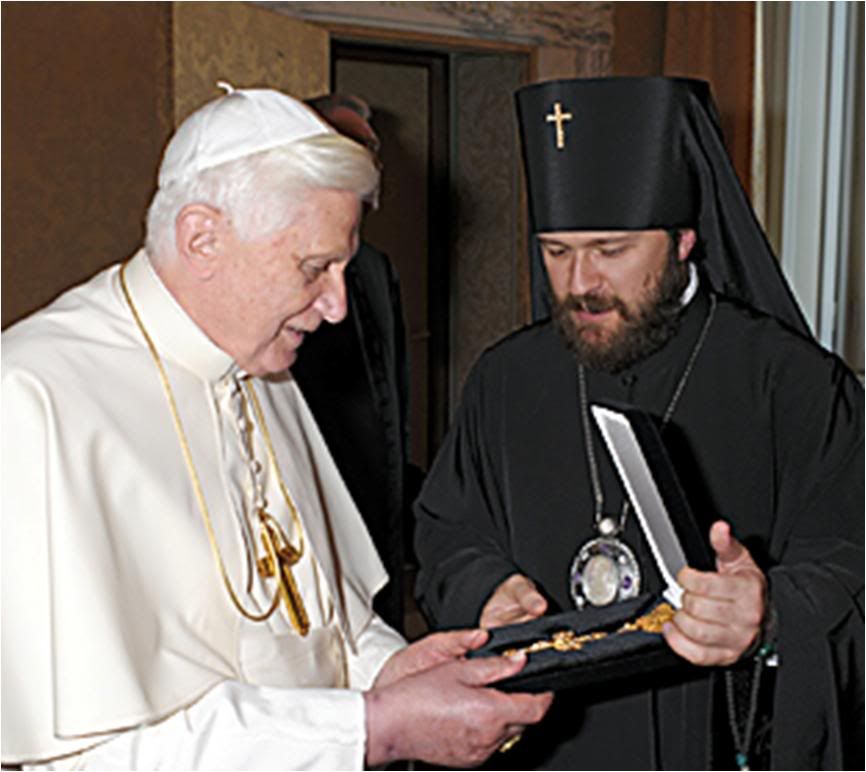
On Friday morning, Sept. 18, Benedict XVI met with Archbishop Hilarion of Volokolamsk, president of the department for external Chruch relations of the Patriarchate of Moscow, at the Apostolic Palace in Castel Gandolfo.
This was the Archbishop Hilartion's first official visit to Rome since he was named to his present poistion on March 31, replacing Metropolitan Kirlll who was elected Patriarch of Moscow after the death of Alexei II.
The Russian orthodox prelate was invited by Cardinal Walter Kasper, president of the Pontifical Council for Promoting Christian Unity, who accompanied his guest to Castel Gandolfo, along with his assistant for the Council's Oriental section, Jesuti Fr. Milan Zudt.
Archbishop Hilarion has also met with the Vatican Secretary of state, the Prefect of the Congregation for Oriental Churches, and the president of the Pontifical Council for Culture.
John Thavis of CNS does his best with scant information, padded by previously known bacground.
Pope meets with Russian Orthodox official,
Vatican says ties improved
By John Thavis

VATICAN CITY, Sept. 18 (CNS) – Pope Benedict XVI met with a key official of the Russian Orthodox Church amid signs of a significant improvement in relations.
The Vatican provided no details of the Pope’s encounter Sept. 18 with Russian Orthodox Archbishop Hilarion, president of the Moscow Patriarchate’s Department for External Church Relations. The private meeting took place at the Pope’s summer residence in Castel Gandolfo.
Archbishop Hilarion was in Rome for five days of meetings and talks with Vatican officials and Catholic groups, at the invitation of Cardinal Walter Kasper, the Vatican’s chief ecumenist.
Speaking to Vatican Radio Sept. 17, Cardinal Kasper said the Church’s relations with the Russian Orthodox had improved appreciably under Pope Benedict, and that the Moscow patriarchate was expected to participate in a major dialogue session with the Vatican in mid-October.
“Pope Benedict is highly regarded by the Russian Orthodox Church for his moral positions and also because he doesn’t take into account political correctness. They esteem him highly, and this helps our relations,” Cardinal Kasper said.
Cardinal Kasper, who is president of the Pontifical Council for Promoting Christian Unity, held lengthy talks with Archbishop Hilarion during his visit.
The cardinal said the reduction in tensions from a few years ago was evident in the “very calm conversation” they had about a number of issues, including theological and practical problems.
Perhaps most importantly, the Russian Orthodox will be returning to the plenary meeting of the international Catholic-Orthodox theological commission in Cyprus in October, which will take up the topic of the historic role of the bishop of Rome.
The Russian Orthodox delegation walked out of the commission’s last plenary session in 2007 in an inter-Orthodox dispute that has since been resolved, Cardinal Kasper said.
Cardinal Kasper said he had suggested that the Orthodox churches form some kind of bishops’ conference at the European level that would constitute a “direct partner of cooperation” in such dialogue encounters. This will be a topic of discussion in coming months, he said.
The cardinal said he discussed with Archbishop Hilarion other areas of collaboration, including “problems of the cultural and social field, and also the question of Christian values in Europe: the family, homosexuality, social justice and so on.”
Cardinal Kasper said Catholics and Orthodox have “more or less the same positions” on these issues and can “give common witness, so our voice will be stronger than when we speak alone.”
Cardinal Kasper said chances had improved for a meeting between Pope Benedict and Russian Orthodox Patriarch Kirill, who was elected last January. But the cardinal said such a meeting was not on the immediate agenda, and would probably not take place in Moscow or Rome.
Another Vatican source said a papal visit to Moscow was probably still “years away.”
Before his election, Patriarch Kirill served almost 20 years as chairman of the Russian Orthodox Church’s department for ecumenical relations. In that position, he had met Pope Benedict three times.
Cardinal Kasper said tensions over the status and evangelizing activities of the Roman Catholic Church in the Moscow patriarchate had been largely overcome.
A joint commission has been established to deal with problems and it works very well, the cardinal said, and Italian-born Archbishop Paolo Pezzi of Moscow is “very highly regarded” by the Orthodox.
After his meeting with the Pope, Archbishop Hilarion had a news conference, at which he had intersting comments to make. He was generally positive about better relations today between the Roman Catholic Church and the Russian Orthodox Church, but he was also realistic about a major obstacle - the status of the Greek Orthodox of Ukraine who chose to rejoin the Church of Rome [called Uniates by the Russian Orthodox], and the fact that they have taken back Church property confiscated by the government before World War II, which the Patriarchate of Moscow claims bleongs properly to the Orthodox Church.
The reports of Hilarion's news conference are spread out over a number of Italian wire service bulletins, so I am waiting for a wrap-up story to translate.
[Modificato da TERESA BENEDETTA 18/09/2009 20:48] |
| |
 18/09/2009 22:10 18/09/2009 22:10 |
|
| | | OFFLINE | | Post: 18.424
Post: 1.077 | Registrato il: 28/08/2005
Registrato il: 20/01/2009 | Administratore | Utente Veteran | |
|

 Pope Benedict XVI
Pope Benedict XVI
and 'our older brothers'
by Luigi Accattoli
Translated from

Sept. 18, 2009
Once again, a Pope in Rome's Great Synagogue. The event could have been accelerated by the polemics last winter followed by the Holocaust-negationist statements of the Lefebvrian bishop Richard Williamson, or the earlier dispute over the Good Friday prayer in the Catholic liturgy.
Regardless, the visit is of primary importance and must be judged as an event by itself, before linking it to contingent circumstances.
The great Synagogue of Rome is the nearest synagogue geographically to the Vatican. It is the spiritual seat of the oldest Jewish community in Europe, which also keeps tragic memories of centuries of persecution by the temporal power of the Popes.
These reasons alone give unusual weight to a papal visit, even if this is the second, after John Paul II's historic visit 23 years ago. We are about to witness a new gesture that is laden with significance and hope.
Looking back at the last half century, which has seen an unexpected and fairly rapid rapprochement between Christians and Jews, there are about a dozen events that have seen the Church of Rome and Judaism converging towards mutual encounter.
First of all was the correction of the Good Friday prayer by John XXIII at Easter 1959. [If the revision, which consisted only in taking out references to the 'blindness' of the Jews, was welcomed by the Jews at the time, why did they raise hell 48 years later when Benedict XVI improved on it further by making it clear that the prayer referred to the eschatological future, not to missionary intentions in earthly time?]
It is the starting point for the road to rapprochement that the former Chief Rabbi of Rome Elio Toaff would sum up in a book entitled Da perfidi giudei a fratelli maggiori (From faithless Jews to older brothers)(Mondadori 1987), which was published shortly after the visit of John Paul II to his synagogue.
The second event - which is the major step in this story - was the conciliar declaration on relations with non-Christian religions, Nostra aetate(In our time), which was approved by the Second Vatican Council, with a vote of 2,221 for and 88 against, on October 28, 1965.
With regard to the Jews, Nostra aetate affirms that "the death of Christ cannot be attributed indiscriminately to all Jews who lived in his time, nor to the Jews who live today".
John Paul II subsequently carried out four creative gestures to recapitulate Vatican II's message of brotherhood: his visit to Auschwitz in 1979, when he stopped in front of the memorial stone "with an inscription in Jewish"; his visit to the Rome Synagogue in 1986, when he addressed the Jews as 'older brothers'; the Day of Forgiveness on March 12, 2000, when he recognized the historical responsibility of Christians for, among other things, persecution of the Jews; his visit to the Wailing Wall in Jerusalem on the 26th of the same month, during which, like a Jew among Jews, he left in a fissure of the wall a written version of the 'request for forgiveness' that he had pronounced in St. Peter's Basilica earlier.
For his part, Benedict XVI has done at least two analogous gestures: In August 2005, he visited the Synagogue in Cologne - which had been destroyed in the Nazis' Kristallnacht of 1938; and last May 12, he prayed at the Wailing Wall. [And also left a prayer. Strangely, Accattoli omits Benedict's own visit to Auschwitz in May 2006; and the visit of both Popes to Yad Vashem Holocaust memorial in Jerusalem.]
Before his visit to the Holy Land, Benedict XVI addressed the confederation of presidents of the major American Jewish organizations in February, echoing his predecessor's 'mea culpa' on anti-Semitism, adding:
"The hatred and contempt for men, women and children shown during the Shoah were a crime against God and against humanity. It is obvious that any negation or attempt to minimize this terrible crime is intolerable and completely unacceptable".
In 'returning' to the Synagogue of Rome, Pope Benedict XVI will be making a very important act that confirms and reinforces what has predecessor has done.
TWo years ago, he personally revised the Good Friday prayer used in the traditional liturgy to refer to an eschatological convergence - that is, beyond history - between Christians and Jews in the single Church of Christ, which indicated his concern to keep the faith in an invocation that has a Biblical matrix without contradicting the Conciliar declaration of renewed brotherhood. His visit to the Synagogue of Rome is yet another proof of this Conciliar brotherhood.
Like his predecessor, he too will pray together with 'our older brothers', and that prayer together will sound an invitation to the entire Catholic community to follow the example of the Bishop of Rome.
[Modificato da TERESA BENEDETTA 19/09/2009 20:09] |
| |
 18/09/2009 22:41 18/09/2009 22:41 |
|
| | | OFFLINE | | Post: 18.425
Post: 1.078 | Registrato il: 28/08/2005
Registrato il: 20/01/2009 | Administratore | Utente Veteran | |
|


 Pope and Patriarchs meet tomorrow
Pope and Patriarchs meet tomorrow
to discuss Church future in the Middle East
by Fady Noun

BEIRUT, Sept. 18 (AsiaNews - Tomorrow, the heads of the seven Catholic Rites represented in the Middle East will meet with Pope Benedict XVI.
The meeting is expected to focus on the growth of fundamentalism in the Middle East and the concerns it is generating among Christians; as well as the importance of Islamic-Christian dialogue, the status of Eastern Catholic Patriarchs in the Universal Church, and the Ecclesiastic jurisdiction in Kuwait and the Gulf States.
Maronite Patriarch Nasrallah Boutros Sfeir, Armenian Catholicos Bédros XIX and Syriac Catholic Patriarch Ignace Joseph III Younan arrived in Rome yesterday; Melkite Patriarch Gregory III, Chaldean Patriarch Emmanuel Delly, Latin Patriarch of Jerusalem Fouad Twal and Coptic Patriarch Antonios Naguib will join them today.
The Patriarchs’ observations are contained in a note to be delivered to the Pope. In their meeting, they plan to talk in great detail with the Holy Father first of all about issues relating to the place of their Churches in the Universal Church as well as other ecclesiological matters, including the ecclesiastical jurisdiction of Kuwait and the other Gulf emirates - countries which in recent years have welcomed tens of thousands of Arab Christian blue and white collar workers attracted by their booming economies.
The Eastern Churches want Rome to reflect on the fact that from a historical perspective the region should belong to the Antiochian Rite.
The Patriarchs are also concerned about the fate of Christians of the Middle East, who are challenged, especially in Egypt and Iraq, by the growth of fundamentalism. They will stress the importance of a strong and concerted international action to redress the injustice visited upon Palestine, and will recommend a just resolution that would include the right of Palestinians to their own state.
They also insist on the importance of the Islamic-Christian dialogue.
During their stay in Rome, the Patriarchs will also participate in a preparatory session on Sept. 21-22 for a special assembly of the Synod of Bishops for the Middle East, which should be held in the Vatican next year.
[Modificato da TERESA BENEDETTA 19/09/2009 02:03] |
| |
 19/09/2009 13:59 19/09/2009 13:59 |
|
| | | OFFLINE | | Post: 18.426
Post: 1.079 | Registrato il: 28/08/2005
Registrato il: 20/01/2009 | Administratore | Utente Veteran | |
|
 Saturday, Sept. 19
Saturday, Sept. 19
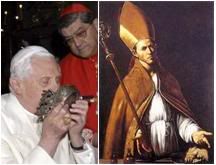 SAN GENNARO [Januarius] (Italy, 275-305)
SAN GENNARO [Januarius] (Italy, 275-305)
Bishop and Martyr (under Emperor Diocletian)
Famous for the twice-yearly liquefaction of his blood
at his church in Naples (photo shows Benedict XVI
venerating the relic on his visit to Naples in 2007)
OR today.
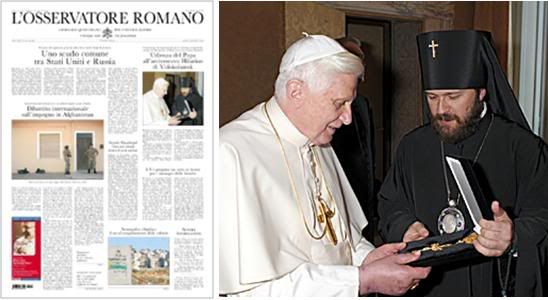
Page 1 has the brief item on the Pope's meeting with Archbishop Hilarion from the Patriarchate
of Moscow. Other stories: NATO secretary-general proposes common US-Russia-NATO missile shield
in Europe; Iran's Ahmadinejad claims his country does not intend to have nuclear armaments;
international debate over continuing allied commitment in Afghanistan, as Italy prepares state funeral
for six Italian soldiers killed in Kabul by a terrorist bomb; the European Union proposes a ceiling
for bank managers' bonuses; and Israeli PM Netanyahu reiterates he will not freeze new construction
in existing West Bank settlements.
THE POPE'S DAY
The Holy Father met today with
- The Patriarchs and major Archbishops of the Eastern Churches. Address in Italian. He announced
a special assembly for the Middle East of the Bishops Synod to be held in the Vatican on
Oct 10-24, 2010. Afterwards, he had lunch with them at the Swiss Hall of the Apostolic Palace
in Castel Gandolfo.
The Holy Father has named Cardinal Franc Rode, prefect of the Congregation for the Institutes
of Congregated Life and Societies of Apostolic Life, as his personal representative to the millennial
anniversary of the Diocese of Alba Iulia in Romania on Sept. 29.
The Vatican Press Office announced it will hold a news briefing on Tuesday, Sept. 22 on the Pope's trip
to the Czech Republic Sept. 26-28.
'MONTHLY ANNIVERSARY'


FOUR YEARS, FIVE MONTHS, AND COUNTING....
AD MULTOS ANNOS, SANCTO PATER!
THANK YOU FOR ALL YOU ARE
TO THE CHURCH, TO THE WORLD, TO ALL OF US.

[Modificato da TERESA BENEDETTA 19/09/2009 14:11] |
| |
 19/09/2009 14:40 19/09/2009 14:40 |
|
| | | OFFLINE | | Post: 18.427
Post: 1.080 | Registrato il: 28/08/2005
Registrato il: 20/01/2009 | Administratore | Utente Veteran | |
|


 As anticipated by AsiaNews yesterday (see earlier post on this page)...
Pope announces special Synod assembly
As anticipated by AsiaNews yesterday (see earlier post on this page)...
Pope announces special Synod assembly
for the Middle East in October 2010

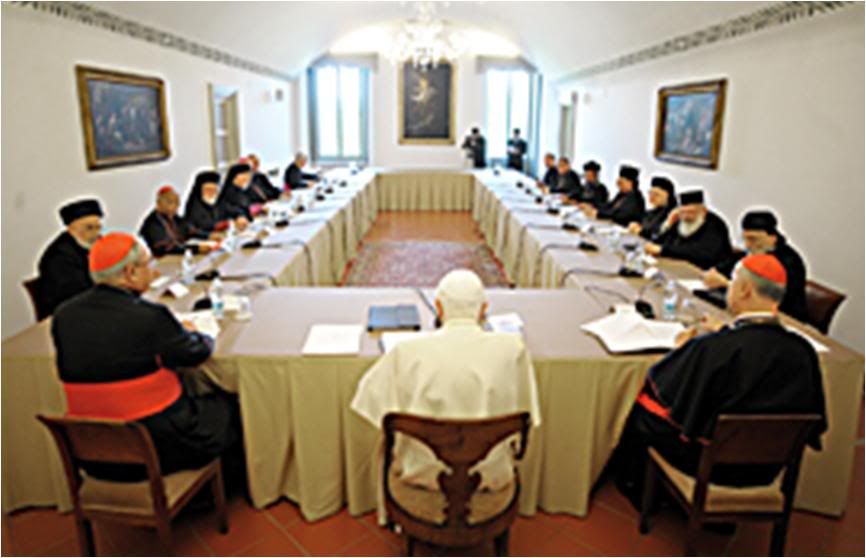 The Pope is flanked by Cardinal Leonardi Sandri, Prefect of the Congregation for Oriental Churches (left, above) and Cardinal Tarcisio Bertone, Secretary of State.
The Pope is flanked by Cardinal Leonardi Sandri, Prefect of the Congregation for Oriental Churches (left, above) and Cardinal Tarcisio Bertone, Secretary of State.
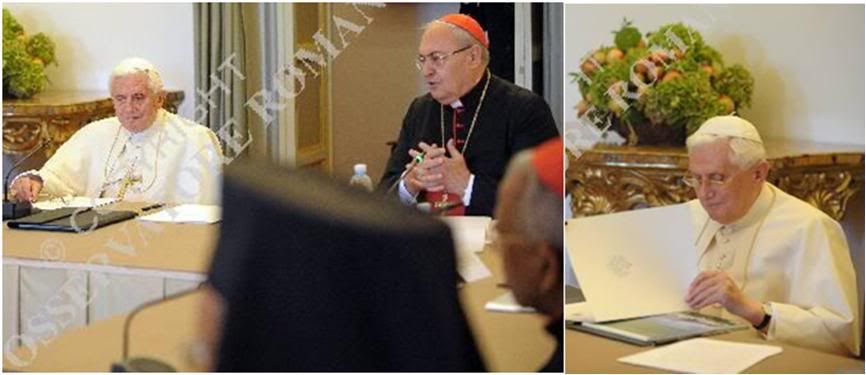
CASTEL GANDOLFO, Sept. 19 (Translated from Apcom) - The Pope has officially announced the convocation of a special Synod assembly for the Middle East next year.
Benedict XVI made the announcement to the Patriarchs and major Archbishops of the Oriental Churches whom he met this morning at the Sala della Rocca of the Apostolic Palace in Castel Gandolfo.
"I take the occasion to announce a Special Assembly of the Bishops Synod for the Middle East, called by me to take place October 10-24, 2010, on the theme "The Catholic Church in the Middle East: Communion and testimony". The Biblical epigram for the assembly is
"The community of believers was of one heart and mind" (Acts 4,32).
"I have not forgotten", the Pope said, "the appeal for peace that you placed in my hands at the end of the special assembly of the Synod last October", he said. "In speaking of peace, my thoughts go first of all to the regions of the Middle East".
"On other occasions you have asked for more frequent contact with the Bishop of Rome in order to render more firm the communion of your respective Churches with the Successor of Peter, so we may examine together subjects of particular urgency.
"I realize how essential it is to promote that synodality that is so dear to Oriental ecclesiology and welcomed with appreciation by the Second Vatican Council."
It was an Iraqi bishop who had first requested the Pope directly, last January, to call a synod assembly on the situation of the Christians in the Middle East (Afghanistan, Cyprus, Iran, Iraq, Jordan, Israel, Lebanon, Syria and Turkey*).
"The problems are similar in Iraq, in Lebanon and in Palestine - Christians are leaving," explained Mons. Louis Sako, Chaldean bishop of Kirkuk. "A Synod assembly would allow us to examine and understand the problem better . If we do not have a clear vision, then Christians won't remain in teh Middle East and will leave this land that was once blessed but now appears to be cursed".
Other issues that 'deserve' a synodal assembly, says the Iraqi bishop, are Christian witness in the lands where they are a tiny minority, relationships with the Muslim majority, and relationships with the political world.
[*The paradox is that as these countries are being depopulated of their Christians, there are now large Christian communities in Saudi Arabia and the oil-rich Gulf States, which are dependent on a largely foreign work force. Majority of these foreign laborers come from the Philippines, Asia's only Catholic country. In Saudi Arabia alone, there are more than a million of them.]
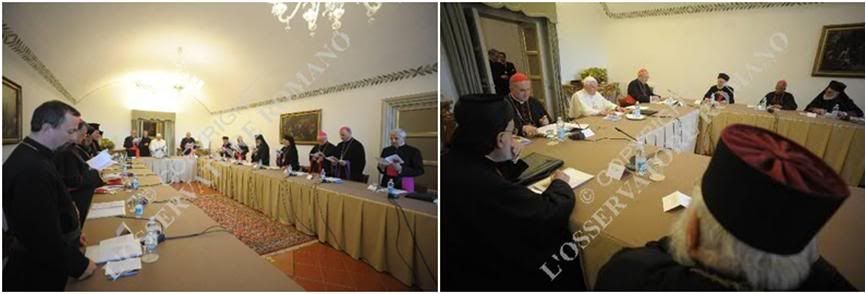 Here is a translation of the remarks delivered by the Holy Father to the ranking Catholic prelates in the Middle East:
Here is a translation of the remarks delivered by the Holy Father to the ranking Catholic prelates in the Middle East:
Eminent Cardinals,
Beatitudes,
Venerated Patriarchs and Major Archbishops!
I greet you all cordially and thank you for having accepted the invitation to participate in this encounter: To each of you, I give the fraternal embrace of peace.
I greet Cardinal Tarcisio Bertone, my Secretary of State, and Cardinal Leonardo Sandri, prefect of the Congregation for Oriental Churches, together with the Secretary and other members of the dicastery.
Let us thank God for this informal meeting which will allow us to listen to the voice of the Churches that you serve with admirable abnegation, and to strengthen the bonds of communion which link them to the Apostolic See.
Our meeting today reminds me of April 24, 2005, at the start of my Pontificate, when, at the tomb of St. Peter, I expressed the wish to undertake an ideal pilgrimage to the heart of the Christian Orient: a pilgrimage which today marks another significant stage which I intend to pursue.
In different circumstances, you have asked for more frequent contact with the Bishop of Rome in order to make ever more firm the communion of your churches with the Successor of Peter and so that we can examine together, on such occasions, subjects of particular importance.
This was a proposal you renewed at the last Plenary Assembly of the Congregation for Oriental Churches and at the General Assembly of the Bishops' Synod.
As for me, I deem it a primary duty to promote that synodality that is so dear to Oriental ecclesiology and accepted with appreciation by the Second Vatican Ecumenical Council.
I fully share the esteem of the Conciliar assembly for your Churches in the decree Orientalium Ecclesiarum, and that my venerated predecessor John Paul II reiterated especially in the apostolic exhortation Orientale Lumen, along with the hope that the Catholic Churches of the East may 'flourish' in order to carry out "with renewed apostolic vigor the mission entrusted to them - to promote the unity of all Christians, especially in the East, according to the degree on ecumenism..." (Orientalium Ecclesiarum, 1).
The ecumenical horizon is often linked to the inter-religious. In both fields, the whole Church needs the experience of coexistence that your churches have matured since the first Christian millennium.
Venerated brothers, in this fraternal meeting, your interventions will certainly bring to light the problems that assail you which can only be adequately addressed by the competent offices.
I wish to assure you that you are constantly in my thoughts and in my prayers. In particular, I do not forget the appeal for peace that you placed in my hands at the end of the Bishops' Synod assembly last October.
And when speaking of peace, my thought goes, first of all, to the countries of the Middle East. Therefore, I take this opportunity to announce a Special Assembly of the Bishops' Synod for the Middle East, which I have called to meet on October 10-24, 2010, on the theme The Catholic Church in the Midde East: Communion and testimony - "The community of believers was of one heart and mind" (Acts 4,32).
Even as I express the hope that the meeting today will bring the expected results, and invoking the maternal intercession of teh Most Blessed Mary, I bless you all and the Catholic Oriental Churches from the heart.
Pope says bishops will discuss Middle East
at special meeting in October 2010

VATICAN CITY, Sept. 19 (AP) — Pope Benedict XVI has announced a special meeting of bishops next year to discuss Middle East peace efforts and the role of the Catholic Church in the region.
Addressing bishops and patriarchs from Eastern rite churches, Benedict said Saturday that the meeting will take place Oct. 10-24, 2010, and will be titled "The Catholic Church in the Middle East: communion and testimony."
The meeting of bishops, called a synod, will gather Church leaders from the Middle East and around the world.
The Pope and the Vatican have long been active on the Middle East diplomatic front, seeking to protect Christians in the Holy Land and elsewhere in the region while supporting efforts to solve the Israel-Palestinian dispute.
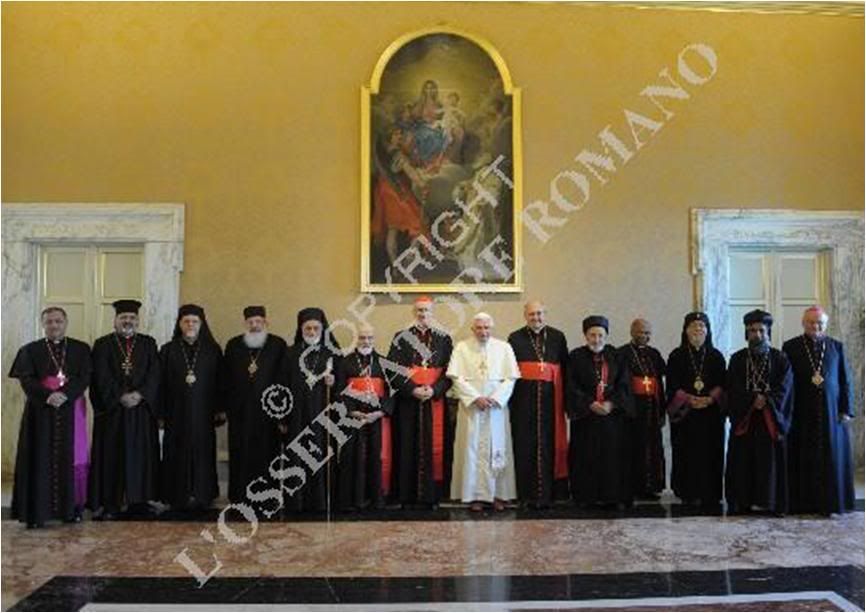
[Modificato da TERESA BENEDETTA 20/09/2009 19:39] |
| |
 19/09/2009 17:38 19/09/2009 17:38 |
|
| | | OFFLINE | | Post: 18.429
Post: 1.082 | Registrato il: 28/08/2005
Registrato il: 20/01/2009 | Administratore | Utente Veteran | |
|

 Cardinal Bagnasco in a lecture on CIV:
Cardinal Bagnasco in a lecture on CIV:
'Ecological awareness is good
but defense of human life more important'
by Salvatore Izzo

GENOA, Sept. 19 (Translated from AGI) - For Pope Benedict XVI, "eugenics is of greater concern than the loss of biodiversity in the ecosystem", while "abortion and euthanasia corrode the sense of the law and hinder from the start the acceptance in society of weaker human beings, resulting in a wound to the human community with enormous consequences in human degradation".
The observation - which seems to respond to not a few emphases in the media on the 'greenness' of the Ratzinger Pontificate - came in a lectio magistralis delivered this morning by Cardinal Angelo Bagnasco, Archbishop of Genoa and president of the Italian bishops conference (CEI), at a conference on practical illustrations of Benedict XVI's third encyclical, Caritas in veritate.
Cardinal Bagnasco pointed out that the Holy Father forcefully underscores that "if personal and social sensitivity to the acceptance of new life is lost, then other forms of acceptance useful to social life will also dry up".
According to the cardinal, the fact that the Pope's attention to ecological concerns has caught public opinion "could be seen as an experimental confirmation of the validity of the 'integral human development' that Benedict XVI proposes to all men of goodwill, following the great intuition in Paul Vi's Populorum progressio", with the exhortation to "defend not only the land, water and air as gifts of creation belonging to everyone" but "to protect man above all against his own self-destruction".
"It is necessary," said Bagnasco, "to have something like a human ecology that is understood in the right sense. The degradation of nature is, in fact, closely connected to the culture that shapes human coexistence".
In the encyclical, he notes, Benedict XVI affirms that "when human ecology is respected within society, it benefits environmental ecology itself".
Thus, concluded Bagnasco, "the ecological crisis cannot be interpreted as a purely technical fact, but rather as something that points to a deeper crisis, because 'exterior deserts' correspond to 'interior deserts'."
I hope a full text of Bagnasco's lecture will be available soon. Meanwhile, Vatican press director Fr. Federico Lombardi tackled the 'green Pope' image differently in his editorial this week for Octava Dies, the weekly newsmagazine of CTV. I still imagine Kermit the Frog when I hear that phrase 'green Pope' - it's a secular label that is very reductive and superficial when applied to the Vicar of Christ!
The 'green' Pope
by Fr. Federico Lombardi
Translated from
the Italian service of
 The Holy See continues to follow the environmental crisis closely. In his last encyclical, the Pope called on everyone to take greater responsibility for safeguarding Creation, along the principles of justice and solidarity. Here is Fr. Lombardi's editorial this week:
The Holy See continues to follow the environmental crisis closely. In his last encyclical, the Pope called on everyone to take greater responsibility for safeguarding Creation, along the principles of justice and solidarity. Here is Fr. Lombardi's editorial this week:
They have started to call him 'the green Pope'. In fact, in the Magisterium of Benedict XVI, statements on the protection of the environment and the safeguarding of creation have been frequent, and we can even say, continual.
Mankind is becoming ever more conscious and concerned over the effects of his activities on the fragile equilibriums of the planet. The United Nations has scheduled a summit in New York in the next few days on climate changes in preparation for the World Conference on the subject to be held in Copenhagen next month.
For this, the Pope offers a framework of solid religious, rational and moral references for effective action programs and for new lifestyles more appropriate for responsible development.
His last encyclical deals with the theme substantially: the exploitation of non-renewable resources and justice towards poorer populations, questions of power consumption, the responsibility towards future generations, the relationship between ecology and respect for human life.
But above all, the Pope points out, man should "learn to see in Creation much more than just a source of wealth to be exploited" and see it as it really is, namely "the expression of a design of love and truth which speaks to us of the Creator and his love for mankind".
Agreements and compromises among political leaders can achieve this purpose only on the basis of motivations and attitudes that are shared and understood by their respective populations.
We need an orientation for the march forward and the development of mankind. The 'green' Pope and the Church know this well and offer their service to that end.
Further on Cardinal Bagnasco, who met with the Holy Father in Castel Gandolfo yesterday, on the eve of the autumn meeting of the CEI"s Permament Council which starts Monday in Rome. It underlines the fact that the Italian bishops report directly to the Pope as Primate of Italy, not to the Secretariat of State.
Cardinal Bagnasco to open
Italian bishops' Permanent Council
meeting next week - the first
since the Boffo-Berlusconi case
Translated from

The Permanent Council of the Italian bishops' conference (CEI) will meet in Fome from Sept. 21-24. The meeting will start with Eucharistic Adoration at the CEI chapel followed by the opening address of Cardinal Angelo Bagnasco, CEI president.
The agenda includes the program for the General Assembly which will be held in Assisi Nov 9-12. They will review two documents which the General Assembly will vote on - a revised funeral liturgy to be used in Italy, and a pastoral plan for the Church in southern Italy.
They will also examine the first draft of the Pastoral Orientations for the decade 2010-2020. They will consider a proposed pastoral manual for Italian parishes, as well as national initiatives of the Church of Italy for the current Year of the Priests.
They will also approve the bishops' message for the 2010 Day of Life.
P.S. Tomorrow's issue (9/20, Sunday) of L'Osservatore Romano carries the full text of Cardinal Bagnasco's lecture on CIV. Will translate later.
[Modificato da TERESA BENEDETTA 26/04/2010 23:43] |
| |
 20/09/2009 14:13 20/09/2009 14:13 |
|
| | | OFFLINE | | Post: 18.431
Post: 1.084 | Registrato il: 28/08/2005
Registrato il: 20/01/2009 | Administratore | Utente Veteran | |
|
 Sunday, Sept. 20
Sunday, Sept. 20
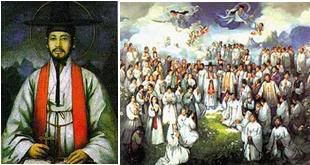 ST. ANDREW KIM TAEGON (Korea, 1821-1846)
ST. ANDREW KIM TAEGON (Korea, 1821-1846)
& 103 OTHER KOREAN MARTYRS, canonized 1984
Andrew Kim was the first Korean-born Catholic priest.
He and the other martyrs died in the 19th-century
persecutions by the Joseon dynasty.
OR today.
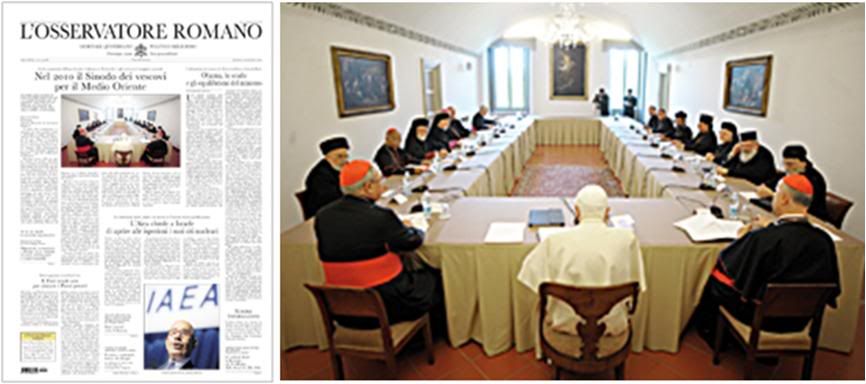
Meeting with the Patriarchs and major archbishops of the Oriental churches, Benedict XVI announces
A Bishops' Synod assembly for the Middle East in 2010
Other Page 1 stories: An analysis of the US decision to scrap Bush-proposed missile defense shield in eastern Europe; IAEA asks to inspect Israeli nuclear sites; IMF notes record unemployment in the G20 countries; and in the inside pages, the full text of Cardinal Bagnasco's lectio magistralis on Caritas in veritate in Genoa yesterday.
THE POPE'S DAY
Sunday Angelus - The Holy Father's mini-homily was on the concept of wisdom in the Letter of St. James.
After the prayer, he deplored the bloodshed in Afghanistan where a terrorist bomb recently took the lives
of seven Italian soldiers, and spoke about his trip to the Czech Republic this weekend.
[Modificato da TERESA BENEDETTA 20/09/2009 19:36] |
| |
 20/09/2009 17:35 20/09/2009 17:35 |
|
| | | OFFLINE | | Post: 18.433
Post: 1.086 | Registrato il: 28/08/2005
Registrato il: 20/01/2009 | Administratore | Utente Veteran | |
|
 ANGELUS TODAY
ANGELUS TODAY
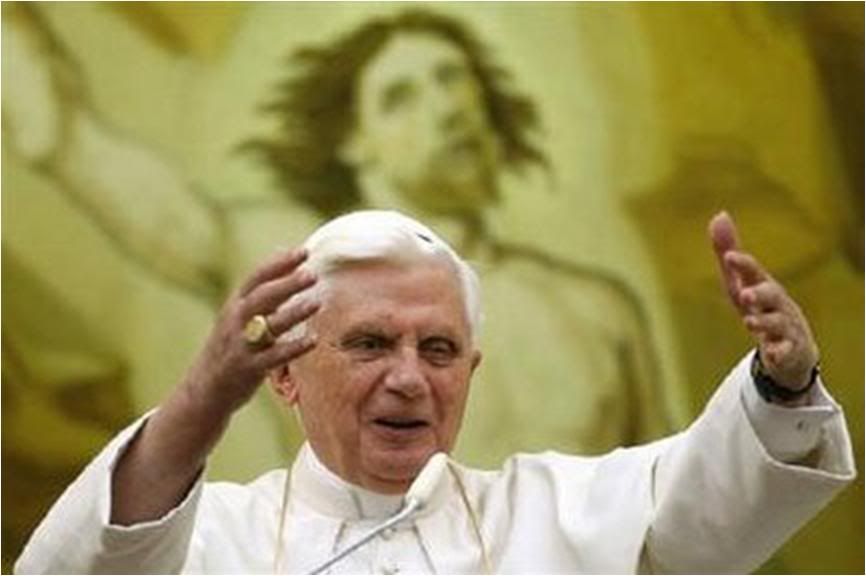 Here is what the Holy Father said in English after the Angelus prayer this noon:
Here is what the Holy Father said in English after the Angelus prayer this noon:
I welcome the English-speaking pilgrims here at Castel Gandolfo and in Rome!
Dear friends, this Saturday I begin my Apostolic Visit to the Czech Republic. I ask all of you to join me in praying for the spiritual success of this journey.
Today’s Gospel reminds us that the one who wishes to be greatest must become a servant of all. May God grant us to be humble servants of others and witnesses to his goodness.
Upon all of you and your loved ones, I gladly invoke the strength and peace of our Lord Jesus Christ.
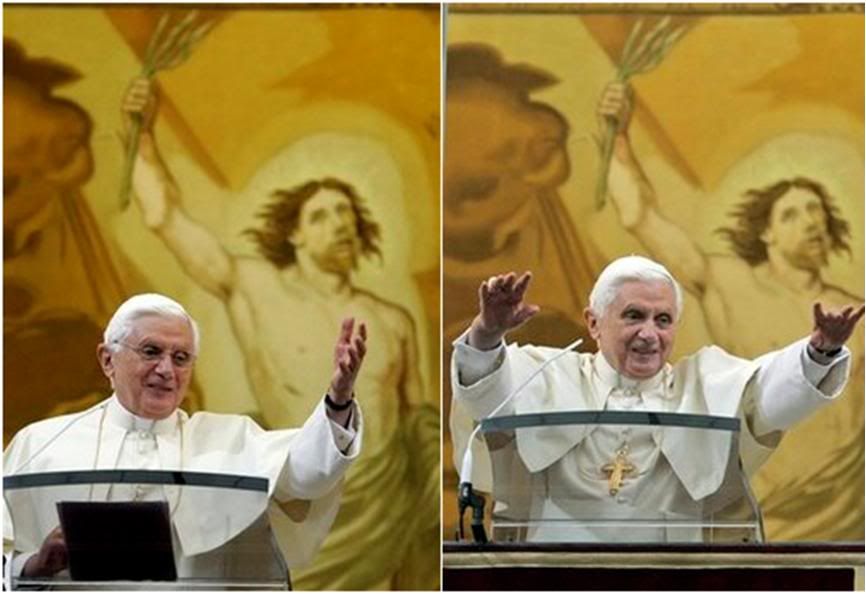 Here is a full translation of the Holy Father's words today:
Here is a full translation of the Holy Father's words today:
Dearest brothers and sisters!
Today, for our usual Sunday reflection, I will consider the passage from the Letter of James which is offered in today's liturgy, and I will dwell, in particular, on an expression that is striking for its beauty and for its relevance.
It deals with a description of true wisdom which the Apostle opposes to the false. While the latter is 'earthly, material and diabolical' - which can be recognized by the fact that it provokes jealousy and selfish ambition, disorders and every foul practice (cfr 3,16) - "the wisdom from above is first of all pure, then peaceable, gentle, compliant, full of mercy and good fruits, without inconstancy or insincerity" (3, 17).
(There follows) a list of seven qualities, according to Biblical usage, which highlight the perfection of true wisdom and the positive effects it produces.
As teh first and principal quality, almost like a prerequisite to the others, St. James cites 'purity', that is, holiness, the transparent reflection, so to speak, of God in the human soul.
Like God from whom it comes, wisdom does not need to impose itself by force, because it has the invincible vigor of truth and love that is self-affirming.
That is why it is peaceable, gentle and complaint - it does not employ partiality, much less have recourse to lies; it is indulgent and generous, and is recognized in the fruits of good that it gives rise to in abundance.
Why do we not stop to contemplate every so often the beauty of this wisdom? Why don't we draw the wisdom of the heart from the uncontaminated source of God's love which detoxifies us from the slag of lies and selfishness?
This goes for everyone, but in the first place, for those who are called on to be the promoters and 'weavers' of peace in the religious and civilian communities, in social and political relationships and in international relations.
In our day, perhaps due as well to certain dynamics inherent in mass societies, one observes not rarely a lack of respect for the truth and for one's given word, along with a widespread tendency to aggressiveness, hate and revenge.
"The fruit of righteousness," St. James wrote, "is sown in peace for those who cultivate peace" (3,18). But to work for peace, one must be a man of peace, putting oneself in the school of "wisdom from above', in order to assimilate the quality and produce its effects.
If each one, in his own field, succeeds in rejecting lies and violent intentions, in words and deeds, carefully cultivating sentiments of respect, understanding and esteem towards others, it will not perhaps resolve all the problems of daily life but they can be faced more serenely and effectively.
Dear friends, once again Sacred Scripture has led us to reflect on the moral aspects of human existence, but starting from a reality that precedes morality itself, namely, true wisdom.
Let us ask God with confidence for the wisdom of the heart, through the intercession of she who welcomed into her womb and generated incarnate Wisdom, Jesus Christ, our Lord.
Mary, Seat of Wisdom, pray for us.
After the prayers, he had the following messages:
From the numerous situations of conflict that exist in the world, tragic news of victims, both military and civilian, reach us almost every day. These are facts that we can never be accustomed to, giving rise to profound reproach as well as uneasiness in societies which have at heart the good of peace and civil coexistence.
These days, the news of the grave attack in Afghanistan against some Italian soldiers has given me deep sorrow. I join in prayer with the suffering of the victims' families and with the military and civilian communities.
I think with similar sentiments of the participation of other international contingents who have also suffered victims recently and who work to promote peace and the development of institutions that are necessary to human coexistence.
I assure all that I will emember them before the Lord with a particular thought for the beloved civilian populations. I invite everyone to raise our prayer to God.
I also wish to renew my encouragement for the promotion of solidarity among nations to counteract the logic of violence and death; favor justice, reconciliation and peace; and sustain the development of peoples starting off with love and reciprocal understanding, as I recently wrote in my encyclical Caritas in veritate (No. 72).
Starting next Saturday, Sept. 26, to Monday, Sept. 28, God willing, I will make an apostolic trip to the Czech Republic. I will stay in Prague, the capital, but I will also be going to Brno in Moravia, and Stara Boleslav, site of the martyrdom of St. Wenceslas, the principal patron saint of the nation.
The Czech Republic is geographically and historically in the heart of Europe, and after having gone through the tragedies of the past century, like the entire Continent, it needs to rediscover the reasons for faith and hope.
In the footsteps of my beloved predecessor John Paul II who visited that country three times, I, too, wish to render homage to their heroic witnesses for the Gospel, ancient and recent, and I encourage everyone to move forward in love and truth.
I thank all those who will accompany me with prayer on this trip so that the Lord may bless it and make it fruitful.
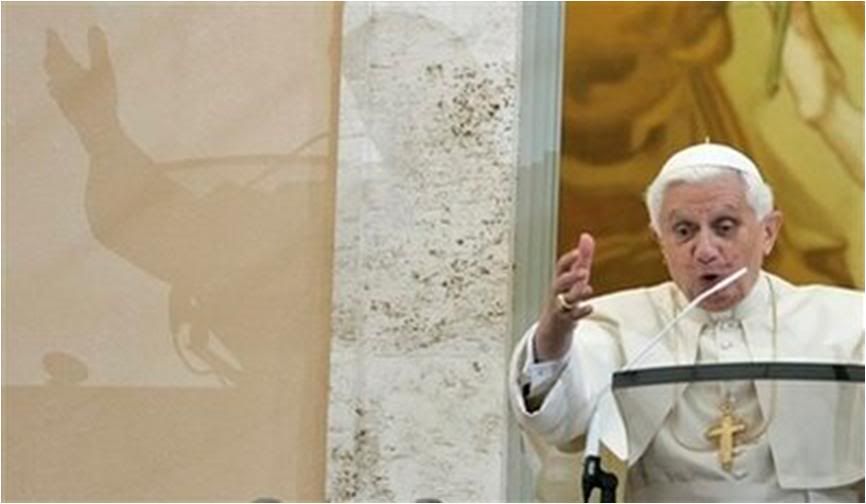
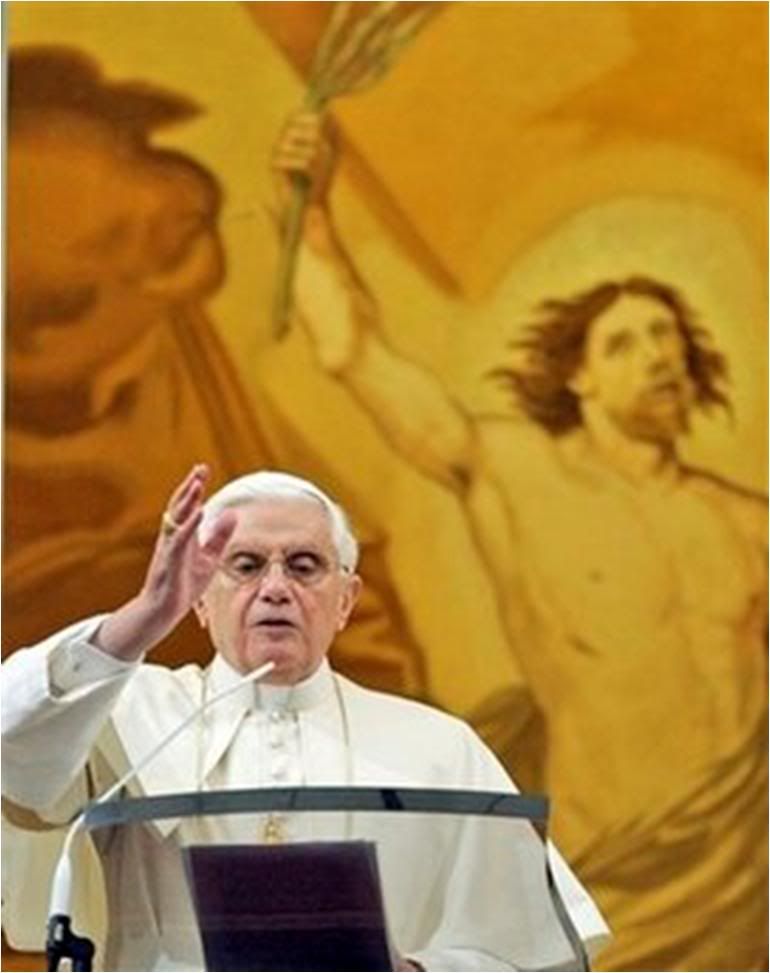 Something is amiss at Vatican Radio online. They have not updated their images since the General Audience on Wednesday!
Something is amiss at Vatican Radio online. They have not updated their images since the General Audience on Wednesday!
[Modificato da TERESA BENEDETTA 20/09/2009 19:05] |
| |
 20/09/2009 22:11 20/09/2009 22:11 |
|
| | | OFFLINE | | Post: 18.434
Post: 1.087 | Registrato il: 28/08/2005
Registrato il: 20/01/2009 | Administratore | Utente Veteran | |
|

 Pope anticipates Bagnasco's
Pope anticipates Bagnasco's
opening address tomorrow
to CEI Permanent Council
by SALVATORE IZZO

CASTEL GANDOLFO, Sept. 20 (Translated from AGI) - Pope Benedict XVI today expressed solidarity with the Italian military who mourn six colleagues killed in Afghanistan, where "international contingents work to promote peace and the development of institutions that are so necessary to human coexistence", and he invited politicians and the media to "reject lies and violent intentions, in words and deeds, carefully cultivating sentiments of respect, understanding and esteem for others".
At the Angelus today, Benedict XVi anticipated at least two subjects of the opening address by Cardinal Angelo Bagnasco when he opens the weeklong autumn session of the Permanent Council of the Italian bishops' conference (CEI) tomorrow: Italian presence in international crisis spots, with firm condemnation of facts like the massacre in Kabul "which give rise to profound reproach as well as uneasiness on societies which have at heart the good of peace and civil coexistence"; and a subject that may not be as tragic but is equally painful for the bishops, "the barbarization of politics and the media", after the Boffo case caused a serious fallout on the equilibrium that had been consolidated in the Italian Catholic world, pushing part of it to what outsiders see as a defensive posture by a Church that will not forget the offensive against it by media outlets considered, rightly or wrongly, to be the instruments of Italian Prime Minister Silvio Berlusconi.
With his words today, Papa Ratzinger seemed to call for a reasoning other than an understandable desire for revenge that is also accompanied by a search for 'accomplices' within the Church itself in the recent offensive, thus risking new victims and unleashing new poisons.
"In our day, perhaps due as well to certain dynamics inherent in mass societies, one observes not rarely," the Pope said, "a lack of respect for the truth and for one's given word, along with a widespread tendency to aggressiveness, hate and revenge."
On the other hand, the Pope spells out the alternative: "If each one, in his own field, succeeds in rejecting lies and violent intentions, in words and deeds, carefully cultivating sentiments of respect, understanding and esteem towards others, it will not perhaps resolve all the problems of daily life but they can be faced more serenely and effectively."
Later, addressing Polish-speaking pilgrims, the Pope recalled that Poland observes today the Day for Social Communications, and referring to the theme of ethics in media, he called on "all workers in the field of social communications to propagate a culture of respect, friendship and dialog". A message that the incoming editor of Avvenire, whoever he will be, must put into practice.
Likewise, the Pope's words two Saturdays ago at the ordination of five new Curial archbishops may also apply to the not-too-easy choice for the CEI of a replacement for Boffo at Avvenire after his traumatic departure.
In his homily, the Pope spelled out the virtues that must characterize whoever exercises authority in the Church: faithfulness (which in this case also means renouncing 'personalism'), prudence (the bishops, in choosing a replacement for Boffo, must avoid new risks, embarrassments and even more problems from internal jealousies), and goodness (which should inspire making Catholic media into instruments for humanization and evangelization).
" Avvenire is not taking to the public square," said a recent Avvenire editorial on information challenges, "it is simply on the news stands", addressing the factions at daggers drawn in the political arena and asking them to respect the 'super partes' [above the fray] character of the Church and its organs.
"No one," said the editorial, "is going to push us. We are not going to be enlisted by anyone, nor will we be intimidated. Avvenire is a newspaper of Catholic inspiration and will not renounce its autonomy and its independence."
[Modificato da TERESA BENEDETTA 26/04/2010 23:46] |
| |
 20/09/2009 23:09 20/09/2009 23:09 |
|
| | | OFFLINE | | Post: 18.435
Post: 1.088 | Registrato il: 28/08/2005
Registrato il: 20/01/2009 | Administratore | Utente Veteran | |
|

 Benedict XVI:
Benedict XVI:
The Synodal Pope
by Giorgio Bernardelli
Translated from

Sept, 19, 2009
In 2010, there will be a Special Assembly for the Middle East of the Bishops' Synod. Benedict XVI also gave the dates and the theme for the special assembly when he formally announced yesterday that he was calling it, to the assembled patriarchs and major archbishops of the Catholic Oriental-rite Churches in the Middle East.
Oct. 10-24, 2010, on the theme "The Catholic Church in the Middle East: Communion and testimony", with the Biblical epigram, "The community of believers was of one heart and mind" (Acts 4,32).
It is a major event in the life of the Church which immediately merits the following distinctions:
1. The announcement came on the eve of the coming Special Assembly for Africa to take place October 4-25, with the new assembly for the Middle East to take place one year later.
If one considers that the next triennial General Assembly of the Bishops' Synod will be held in 2011, after the General Assembly on the Word of God held last year, it appears that under Benedict XVI, a synodal assembly would be an annual event.
It is an important innovation of Benedict XVI's Pontificate, which must be coupled to the procedural innovations he introduced to the General Assembly of 2005 on the Eucharist (the first Synodal assembly in his Pontificate).
It must also be remembered that special assemblies do not involve only the region or continent about whom they are called, but constitute an event for the universal Church (and that is why they are held at the Vatican).
In calling a Synodal assembly every year, Benedict XVI most clearly demonstrates his vision of collegiality in the Church. [In his address to the Middle Eastern patriarchs yesterday, he referred to the concept of synodality "so dear to Oriental ecclesiology and welcomed with appreciation by the Second Vatican Council".]
2. This will be the first Synodal assembly on the Middle East. In 1991, John Paul II called a special assembly for Lebanon, but that was linked to a specific situation, namely, the problems of Lebanon's significant Christian population during the prolonged civil war in the Land of the Cedars.
This time, the Synodal assembly is a true and proper exercise of 'ecclesial geopolitics' - in which the Middle East is treated as a distinct ecclesial district with its own importance and meriting its own special attention. In a way, it becomes the 'sixth continent' for the Church.
Benedict XVI said he was also responding to a request by the area bishops who face challenges unlike those in any other region of the world.
It is significant that the bishop who actually proposed a Synodal assembly for the Middle East was Archbishop Louis Sako of Kirkuk in Iraq, perhaps the country whose Christian community is most threatened.
3. The Pope has chosen the theme of the Synodal meeting: "The Catholic Church in the Middle East: Communion and testimony" - "The community of believers was of one heart and mind" (Acts 4,32).
The title itself gives an important indication in its coupling of communion and testimony.
Christian witness is obviously paramount in the Middle Eastern countries with their overwhelming Muslim populations, and the related problem that many Christians have been forced to emigrate.
But there is also 'communion' which refers to another open nerve in the Christian presence in the Middle East. Middle Eastern Christians are unusually diverse in their rites and confessions, which means that coexistence among them is not devoid of problems.
So Benedict XVI said that the Synodal assembly for the Middle East should be a great experience of unity. Only in union and communion can the Christians of the Middle East be truly witnesses for the hope and peace that come from living the Gospel.
To find out more about this diversity of Christian communities in the Middle East, we can refer to previous reports from the magazine Mondo e Missione reporting on the Christians of Syria, Lebanon, and Iraq.
Organizational work begins Monday
for the Synodal meeting on the Mideast
Translated from
the 9/20/09 issue of

Barely 48 hours after Benedict XVI announced the special assembly of the Bishops' Synod to be held next year, the pre-Synodal council will meet for the first time Monday at the seat of the Synod's General Secretariat in Palazzo Bramante on the Via della Conciliazione.
"There will be two days of work, on Monday, Sept, 21, and Tuesday, Sept. 22, to put together the organizational machinery that must begin full steam ahead because we have little time," said Archbishop Nikola Eterovic, secretary-general of the Synod.
Taking part in the Council are Cardinals Ivan Dias (prefect of the Congregation for the Evangelization of epoples), Walter Kasper (president of the Pontifical Council for Promoting Christian Unity), Jean-Louis Tauran (president of the Pontifical Council for Inter-Religious Dialog) and Leonardo Sandri (prefect of the Congregation for Oriental Churches), along with the Patriarchs Narallah Pierre Sfeir (Maronite), Emannuel II Delly (Chaldean), Antonio Naguib (Coptic), Gregorios II Laham (Greek Melkite), Nerses Bedros XIX Tarmouni (Armenian Catholic), and Fouad Twal (Jerusalem Latin Patriarchate). Patriarch Ignace Youssif III Younan (Syriac) designated Mons. Jules Mikhael Al-Jamil to represent him
Also part of the pre-Synodal council, said Mons. Eterovic, are Arcbishop Ramzi Garmou, president of the Iranian bishops' conference; Bishop Luigi Padovese, president of the Turkish bishops conference; along with some consultant experts. He said more names could be added, as these were the ones that could be available at such short notice.
Eterovic also said that the announcement of a special Synodal assembly was not, in itself, a surprise, since the pastors of the region have been urging it for years. He said the decisive push came after Benedict XVI's pilgrimage to the Holy Land.
The agenda for the organizational meeting will consider "the Pope's suggestions on dialog towards peaceful coexistence in a tormented region, bearing in mind the specific realities in the individual nations".
Eterovic said "The theme for the Synodal assembly was chosen by the Pope himself, after looking through the recommendations we made based on consultations with the bishops of the region".
He said the citation from the Acts of the Apostles is "a reminder that the Middle East is particularly dear to all Christians because the Church was born there, and despite historical developments, it is still present there, with great difficulty but also with hope."
The assembly will take place in the Vatican's Synod Hall (within Aula Paolo VI). It's too early, said Eterovic, to be able to state the number and identities of the participatns, as criteria still have to be set. He did say that there will certainly be ecumenical representatives invited as fraternal delegates.
"Particularly important is how Muslims and Jews can be involved," he said. "We have yet to spell out the modality, but it is obvious that the assembly has to consider the total reality in the Middle East. The Synodal aseembly is a space of open dialog aimed at communion and peace, in justice and in truth. We will find the right way to hear the voices of the Jewish and Muslim worlds".
In fact, he said, dialog and confrontation "with other religions and culture" will be one of the central themes of the assembly "which must start from an internal reflection of the Church on how to strengthen ecclesial communion. This is the Pope's first mandate."
"The diversity of rites and traditions in the Church is a treasure, not an obstacle, and it must be shared. Renewed authentic communion among all Catholics will give rise to strong witness even where the communities are small. Communion makes them more credible".
As for more specific topics, Eterovic said these will be spelled out in the Lineamenta, or guidelines for the assembly.
"I am sure there will be something on reconciliation, following the words and example of the Holy Father when he was in the Holy Land - he opened new horizons in the complex and demanding journey to peace, while respecting the rights of everyone and acknowledging the corresponding responsibilities."
Eterovic believes that the Lineamenta will be ready before the end of the year. "It will be brief, because we have little time to prepare, but we want the communities to have time to discuss it".
The Instrumentum laboris, which will be the working agenda, will be ready by Easter, he said.
"This Synod, which is regional, is exceptional. There are no precedents for it, although there have been two specific assemblies before addressed to the problems of a single nation - the Netherlands and Lebanon, respectively.
[Modificato da TERESA BENEDETTA 21/09/2009 00:13] |
| |
 21/09/2009 14:38 21/09/2009 14:38 |
|
| | | OFFLINE | | Post: 18.439
Post: 1.092 | Registrato il: 28/08/2005
Registrato il: 20/01/2009 | Administratore | Utente Veteran | |
|
 NB: Illustrations are videocaps from CTV's video-clip of the event.
Will the "Third Rome" reunite
NB: Illustrations are videocaps from CTV's video-clip of the event.
Will the "Third Rome" reunite
with the "First Rome"?
Recent meeting could mark a turning point
By Robert Moynihan

WASHINGTON, D.C., SEPT. 21, 2009 (Zenit.org)- Sometimes there are no fireworks. Turning points can pass in silence, almost unobserved.
It may be that way with the "Great Schism," the most serious division in the history of the Church. The end of the schism may come more quickly and more unexpectedly than most imagine.
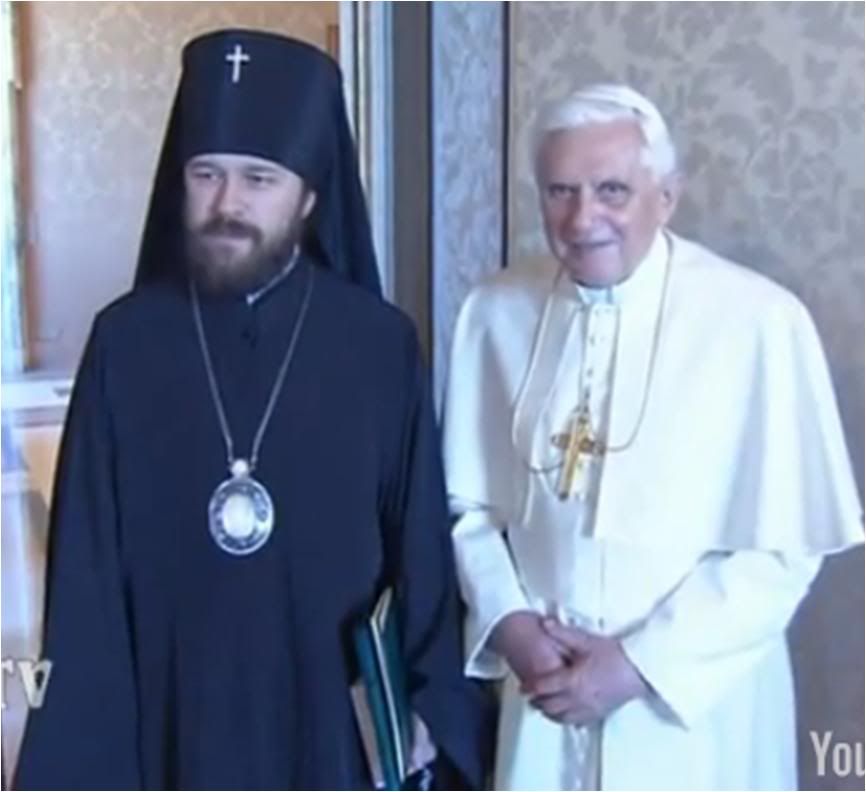
On Sept. 18, inside Castel Gandolfo, the Pope's summer palace about 30 miles outside Rome, a Russian Orthodox Archbishop named Hilarion Alfeyev, 43 (a scholar, theologian, expert on the liturgy, composer and lover of music), met with Benedict XVI, 82 (also a scholar, theologian, expert on the liturgy and lover of music), for almost two hours, according to informed sources. (There are as yet no "official" sources about this meeting -- the Holy See has still not released an official communiqué about the meeting.)
The silence suggests that what transpired was important -- perhaps so important that the Holy See thinks it isn't yet prudent to reveal publicly what was discussed.
But there are numerous "signs" that the meeting was remarkably harmonious.
If so, this Sept. 18 meeting may have marked a turning point in relations between the "Third Rome" (Moscow) and the "First Rome" (Rome) -- divided since 1054.
[I hate to interject a correction to Dr. Moynihan, but there was no Patriarchate of Moscow until 1448, when the Russian Orthodox Church became independent of the Greek Orthodox Church. Moscow itself did not exist before the 1340s. The Great Schism of 1054 was between the Roman Western Church and the Greek Eastern Church, which became the Greek Orthodox Church under teh Patriarchate of Constantinople, of which the Russian Church was a late offshoot. Moscow called itself the 'Third Rome' when, after the fall of Constantinople in 1453, the Russian Church was the only Orthodox Church strong enough to carry on.]
Archbishop Hilarion was in Rome for five days last week as the representative of the new Russian Orthodox Patriarch Kirill of Moscow.
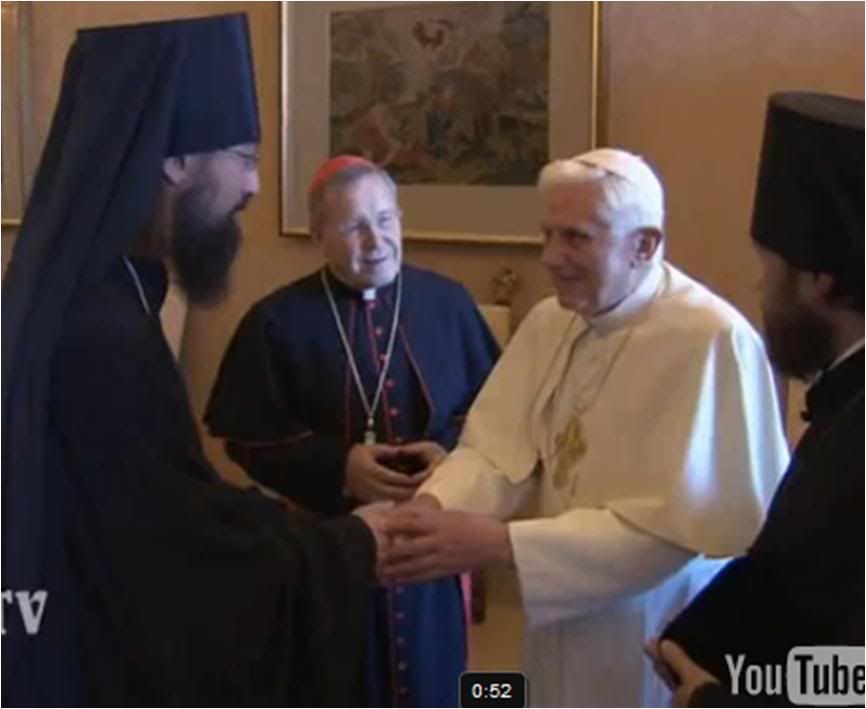 Cardinal Kasper presents the other members of the Russiand elegation to the Holy Fahter.
Cardinal Kasper presents the other members of the Russiand elegation to the Holy Fahter.
One key person Archbishop Hilarion met with was Cardinal Walter Kasper. On Sept. 17, the cardinal told Vatican Radio that he and Archbishop Hilarion had a "very calm conversation."
Cardinal Kasper also revealed something astonishing: that he had suggested to the archbishop that the Orthodox Churches form some kind of "bishops' conference at the European level" that would constitute a "direct partner of cooperation" in future meetings.
This would be a revolutionary step in the organization of the Orthodox Churches.
Cardinal Kasper also said a Pope-Patriarch meeting was not on the immediate agenda, and would probably not take place in Moscow or Rome, but in some "neutral" place (Hungary, Austria and Belarus are possibilities).
Archbishop Hilarion himself revealed much about how his Rome visit was proceeding when he met on the evening of Sept. 17 (before his meeting with the Pope) with the Community of Sant'Egidio, an Italian Catholic group known for its work with the poor in Rome.
"We live in a de-Christianized world, in a time that some define -- mistakenly -- as post-Christian," Archbishop Hilarion said. "Contemporary society, with its practical materialism and moral relativism, is a challenge to us all. The future of humanity depends on our response… More than ever before, we Christians must stand together."
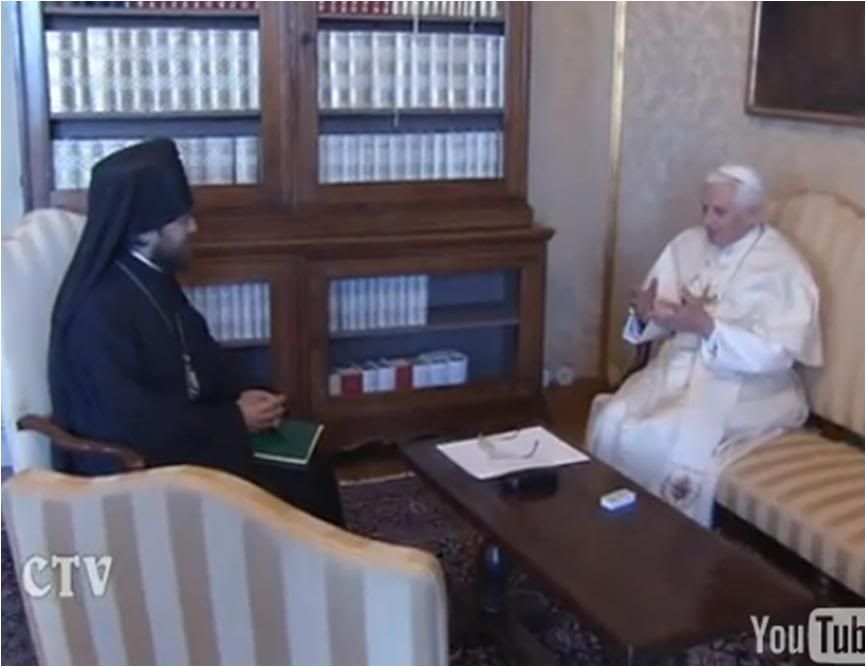
A report from Interfax, the news service of the Moscow Patriarchate, on Sept. 18 revealed that Archbishop Hilarion spoke to the Pope about "cooperation between the Russian Orthodox and Roman Catholic Churches in the area of moral values and of culture" -- in particular during the "Days of Russian Spiritual Culture," a type of exhibit with lectures scheduled for spring 2010 in Rome. (One might imagine that the Pope himself could attend such an exhibition).
In memory of the visit, Archbishop Hilarion gave the Pope a pectoral cross, made in the workshops of Russian Orthodox Church, the report said, Interfax reported.
Today, an Interfax report supplied details of Hilarion's remarks this morning in the catacombs of St. Callixtus.
"Denied by the world, far from human eyes, deep under ground in caves, the first Roman Christians performed the feat of prayer," Hilarion said. "Their life brought the fruit of holiness and martyr heroism. The Holy Church was built on their blood shed for Christ."
Then the Church came out of the catacombs, but Christian unity was lost, the archbishop said.
Archbishop Hilarion said that human sin is the cause of all divisions, while Christian unity can be restored only in the way of sanctity.
"Each of us, conscientiously fulfilling a task the Church has given him or her, is called to personally contribute to the treasury of Christian sanctity and work to achieve God-commanded Christian unity," the archbishop said.
A second Interfax report today added further information about the meeting with the Pope.
"During a talk with Pope Benedict XVI, Archbishop Hilarion of Volokolamsk pointed out the status of Orthodox believers in Western Ukraine where three Orthodox dioceses had been almost eliminated as a result of coercive actions of Greek Catholics in late 1980s and early 1990s," Interfax reported.
Archbishop Hilarion "stated the need to take practical steps to improve the situation in Western Ukraine," within the territories of Lvov, Ternopol and Invano-Frankovsk Dioceses, the report said.
Meanwhile, in Russia itself, the influence of the Russian Orthodox Church, headed by Patriarch Kirill, seems to be growing, though not without opposition.
The rise in Russia of Kirill and his increasing influence in legislative matters seems to be arousing opposition from the "siloviki," forces connected with the old KGB.
In an article in the current issue of Argumenty Nedeli, Andrey Uglanov says that Kirill's extraordinary activity has attracted attention from some who do not like to have their positions questioned, let alone challenged. And that has become Kirill's "big problem."
These "siloviki," Uglanov says, have been offended by Kirill's "anti-Stalinist and anti-Bolshevik actions," including his appearance at the Solovetsky stone in Moscow's Lubyanka Square on the very Day of the Memory of the Victims of Political Repression.
In this context, Hilarion's visit to Rome takes on even more importance.
The Russian Orthodox Church is a power in Russia, but it faces opposition and needs allies.
What is occurring in Hilarion's visit to Rome, then, may have ramifications not only for the overcoming of the "Great Schism," but also for the cultural, religious and political future of Russia, and of Europe as a whole.
{I don't understand why Dr. Moynihan does not appear to factor in the Ecumenical Patriarchate of Constantinople into his speculations. If only for symbolic reasons, the Great Schism will not be healed without Constantinople!]
It is especially significant, in this context, that Hilarion, Kirill's "Foreign Minister," has some of the same deep interests as Benedict XVI: the liturgy, and music.
"As a 15-year-old boy I first entered the sanctuary of the Lord, the Holy of Holies of the Orthodox Church,” Hilarion once wrote about the Orthodox liturgy. “But it was only after my entrance into the altar that the 'theourgia,' the mystery, and 'feast of faith' began, which continues to this very day.
"After my ordination, I saw my destiny and main calling in serving the Divine Liturgy. Indeed, everything else, such as sermons, pastoral care and theological scholarship were centered around the main focal point of my life -- the liturgy."
These words seem to echo the feelings and experiences of Benedict XVI, who has written that the liturgies of Holy Saturday and Easter Sunday in Bavaria when he was a child were formative for his entire being, and that his writing on the liturgy (one of his books is entitled "Feast of Faith") is the most important to him of all his scholarly endeavors.
"Orthodox divine services are a priceless treasure that we must carefully guard," Hilarion has written. "I have had the opportunity to be present at both Protestant and Catholic services, which were, with rare exceptions, quite disappointing… Since the liturgical reforms of the Second Vatican Council, services in some Catholic churches have become little different from Protestant ones."
Again, these words of Hilarion seem to echo Benedict XVI's own concerns. The Pope has made it clear that he wishes to reform the Catholic Church's liturgy, and preserve what was contained in the old liturgy and now risks being lost.
Hilarion has cited the Orthodox St. John of Kronstadt approvingly. St. John of Kronstadt wrote: "The Church and its divine services are an embodiment and realization of everything in Christianity... It is the divine wisdom, accessible to simple, loving hearts."
These words echo words written by Cardinal Ratzinger, now Benedict XVI, who often said that the liturgy is a "school" for the simple Christian, imparting the deep truths of the faith even to the unlearned through its prayers, gestures and hymns.
Hilarion in recent years has become known for his musical compositions, especially for Christmas and for Good Friday, celebrating the birth and the Passion of Jesus Christ. These works have been performed in Moscow and in the West, in Rome in March 2007 and in Washington DC in December 2007.
Closer relations between Rome and Moscow, then, could have profound implications also for the cultural and liturgical life of the Church in the West. There could be a renewal of Christian art and culture, as well as of faith.
All of this was at stake in the quiet meeting between Archbishop Hilarion and Benedict XVI on Friday afternoon, in the castle overlooking Lake Albano.
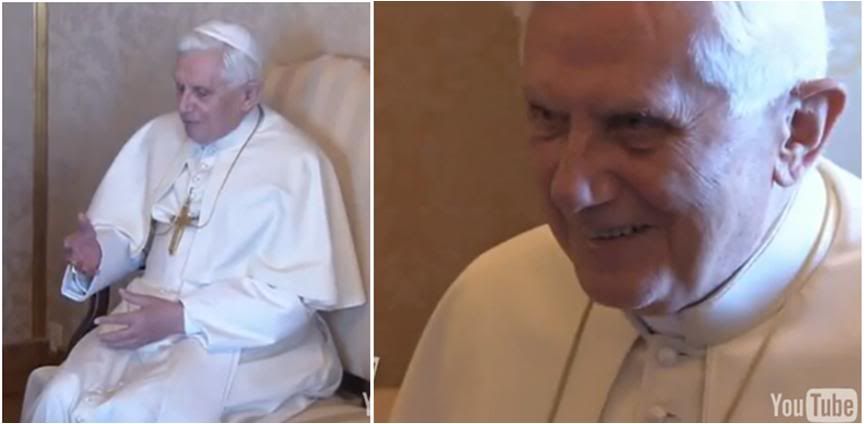 I would love to be proven very wrong, but Dr. Moynihan's optimism is probably too much wishful thinking. We should wait at least until the October meeting in Cyrpus of the Mixed Theological Commission for Theological Dialog between the Catholic Church and the Orthodox Churches.
I would love to be proven very wrong, but Dr. Moynihan's optimism is probably too much wishful thinking. We should wait at least until the October meeting in Cyrpus of the Mixed Theological Commission for Theological Dialog between the Catholic Church and the Orthodox Churches.
Russia has promised it will attend, having walked out of the meeting last year to protest what Moscow considers to be the Patriarch of Constantinople's interference in the affairs of the Estonian Orthodox Church, over which Moscow claims canonical jurisdiction.
Moreover, the hot topic in Cyprus will be where the Commission left off last year, namely, the role of the Pope in a unified Christianity. Because it walked out at the start of the session last year, Russia was not a signatory to the 2008 Ravenna declaration that set the agenda for this year's meeting and said afterwards that it did not necessarily support the document.
[Modificato da TERESA BENEDETTA 27/04/2010 00:04] |
| |
|
|
|
|